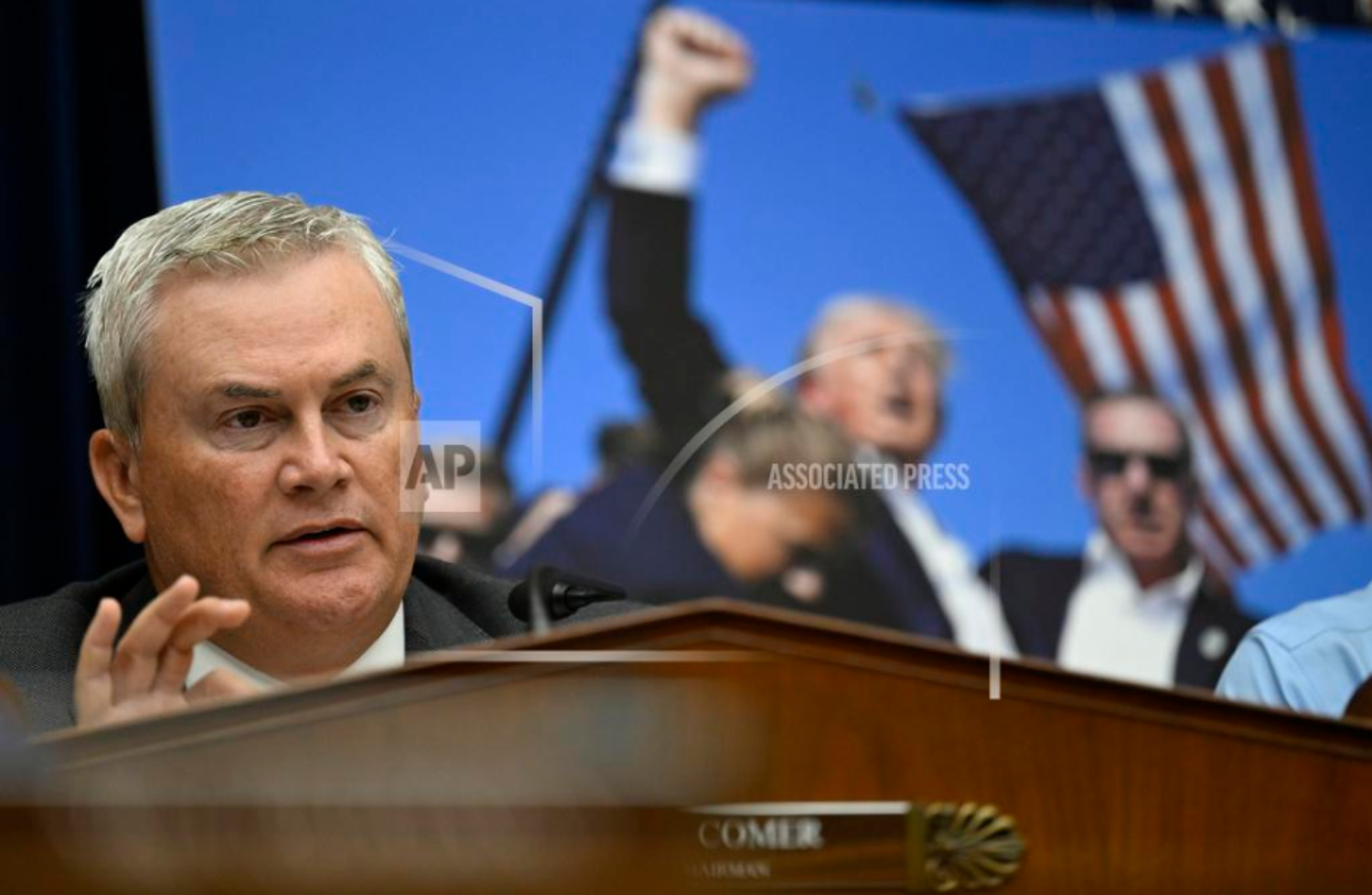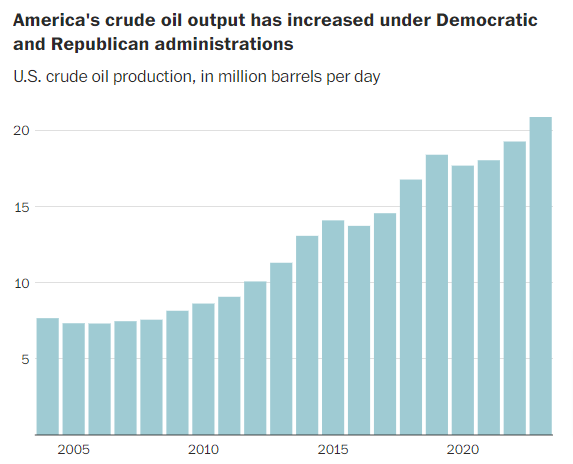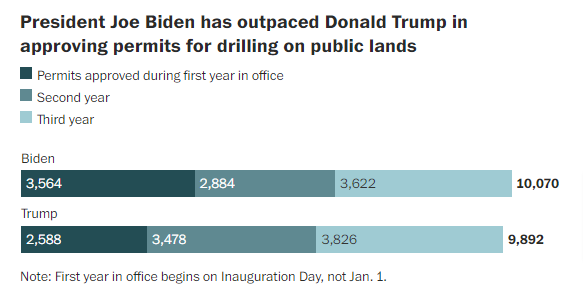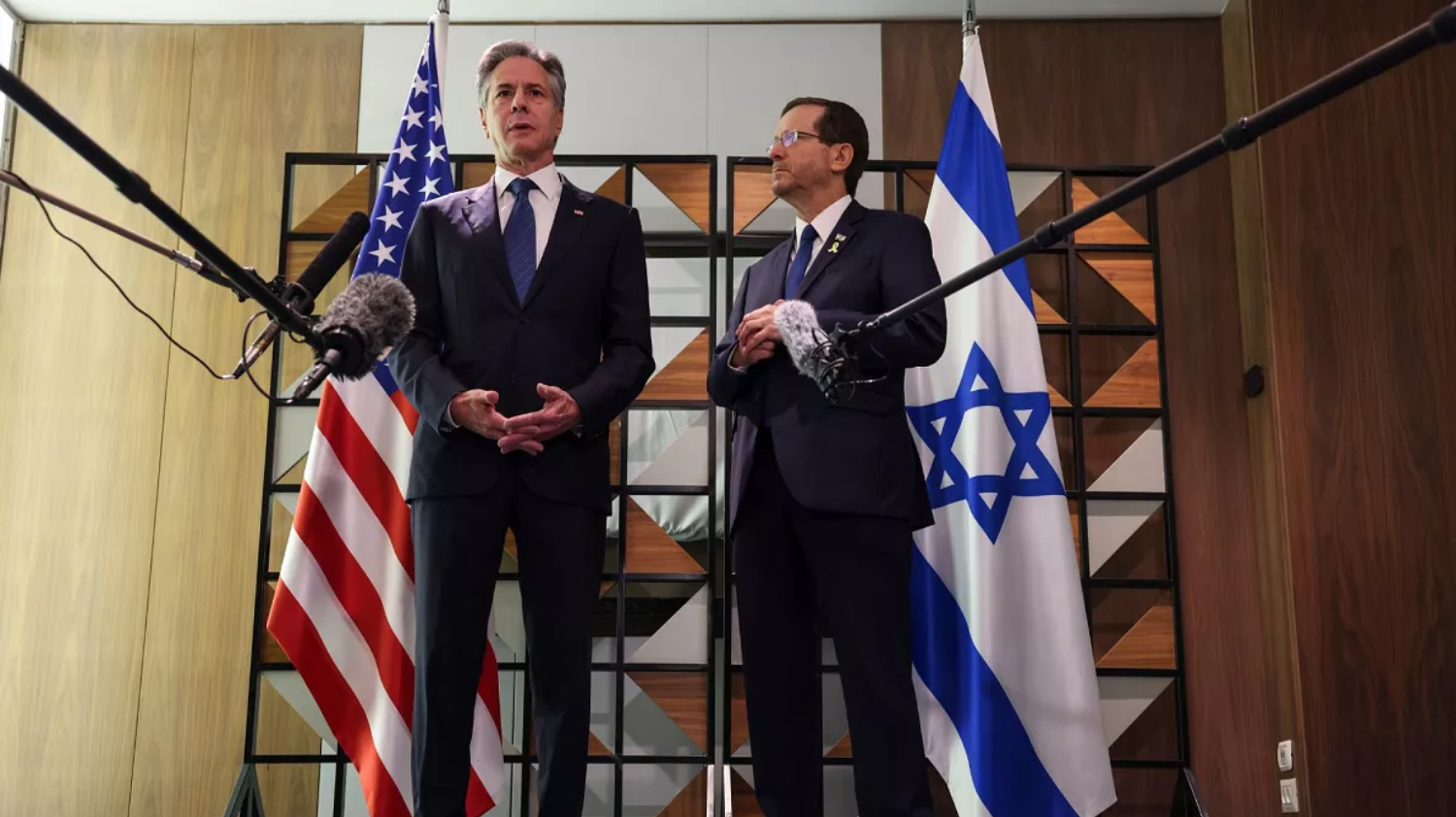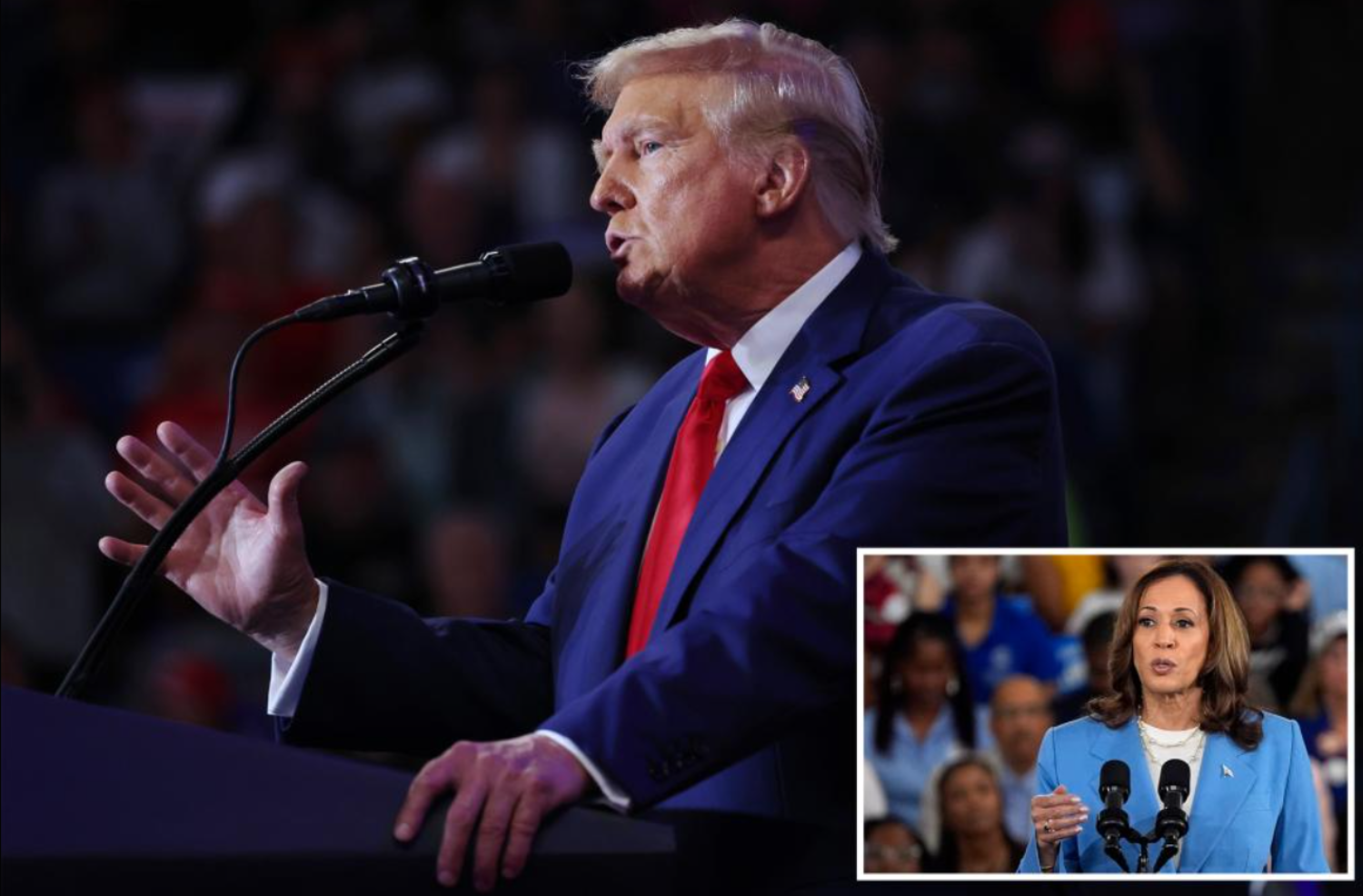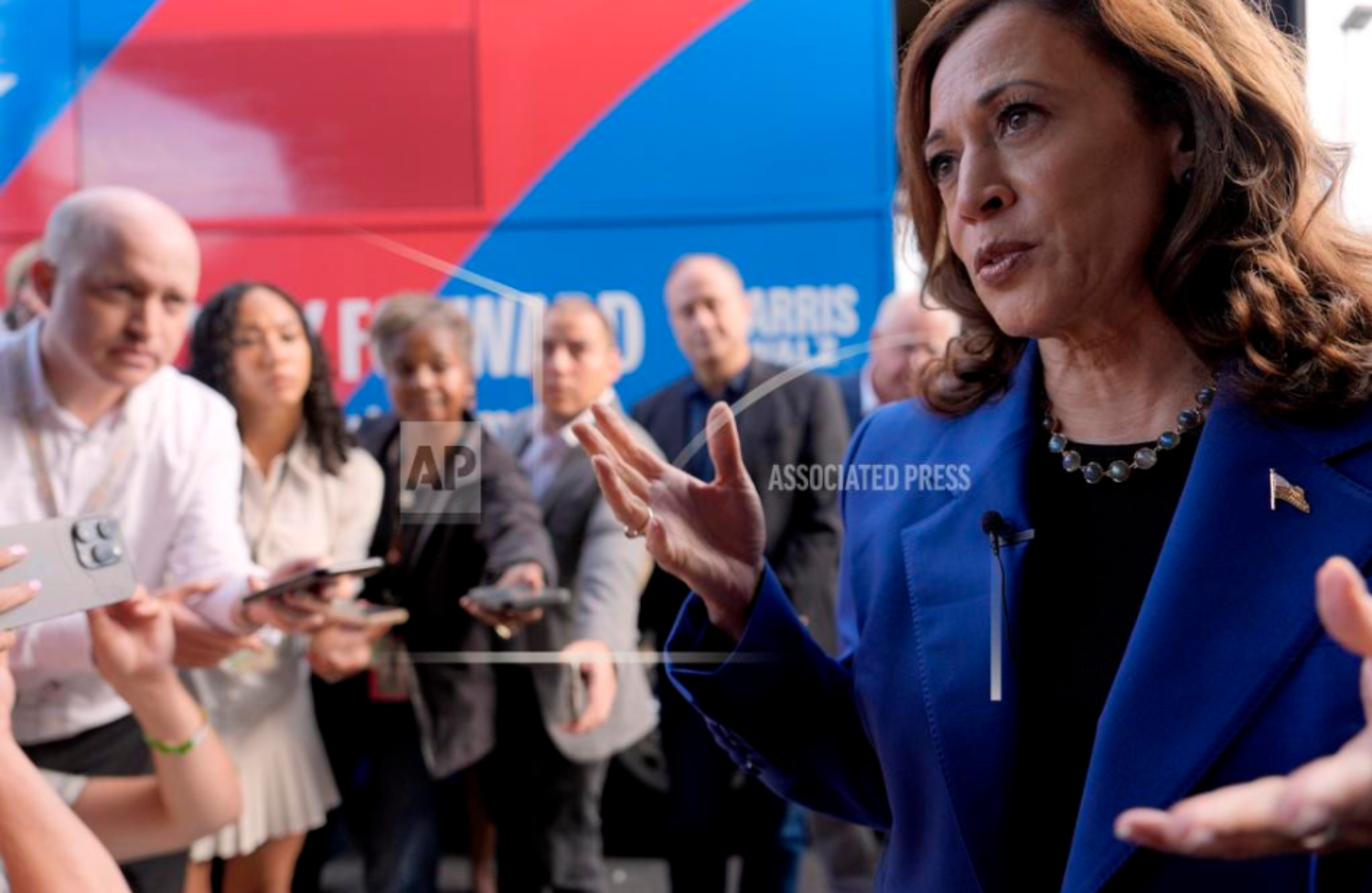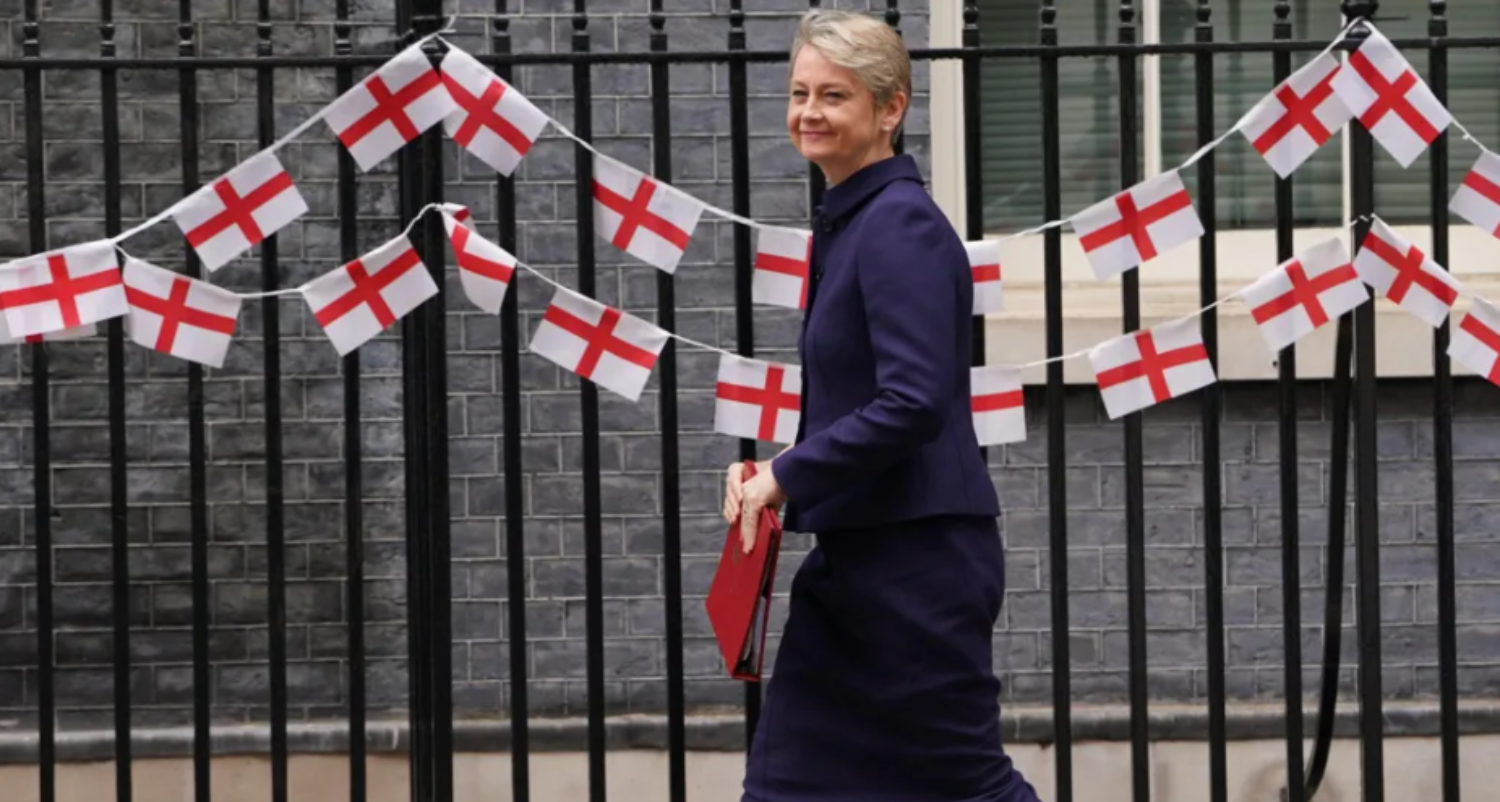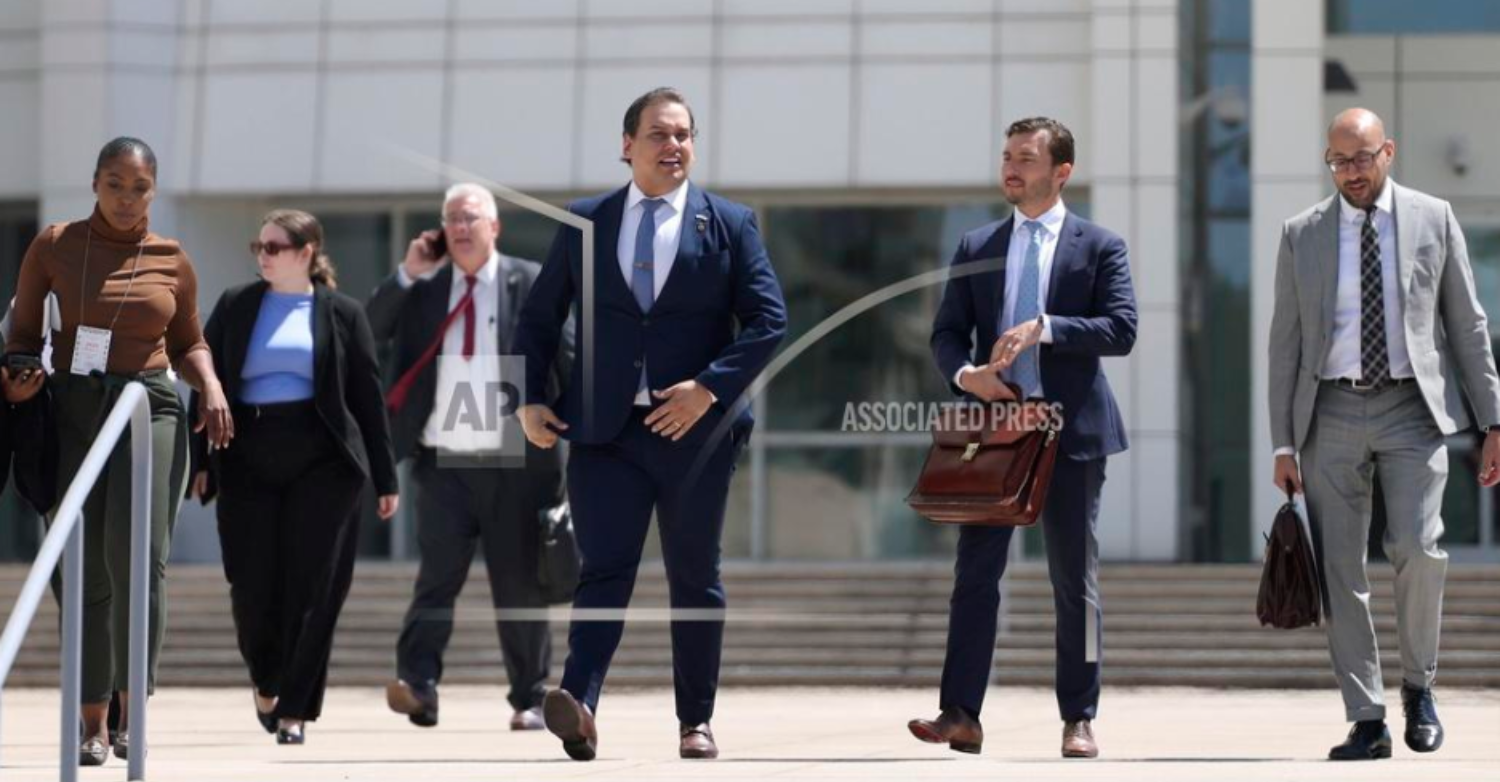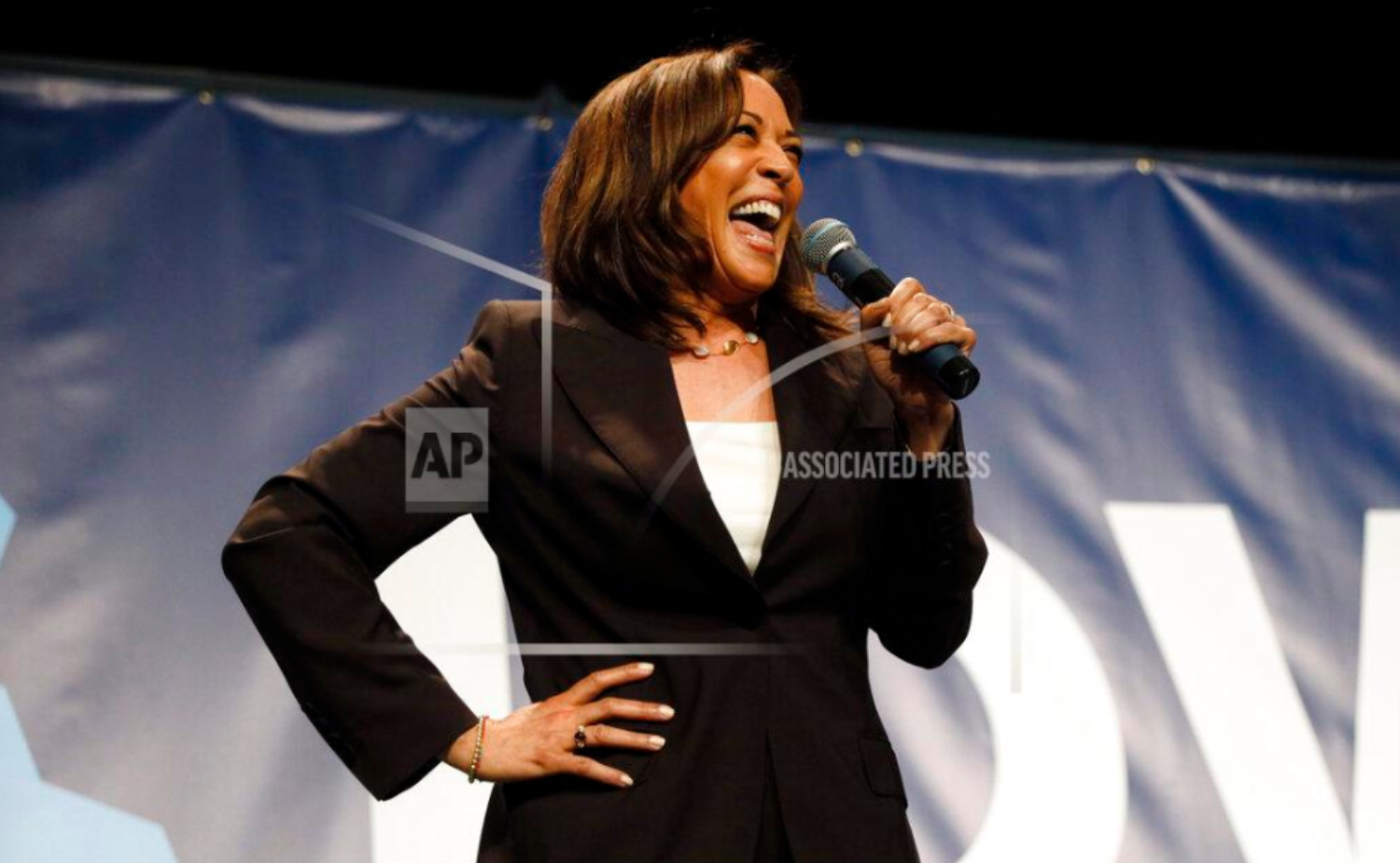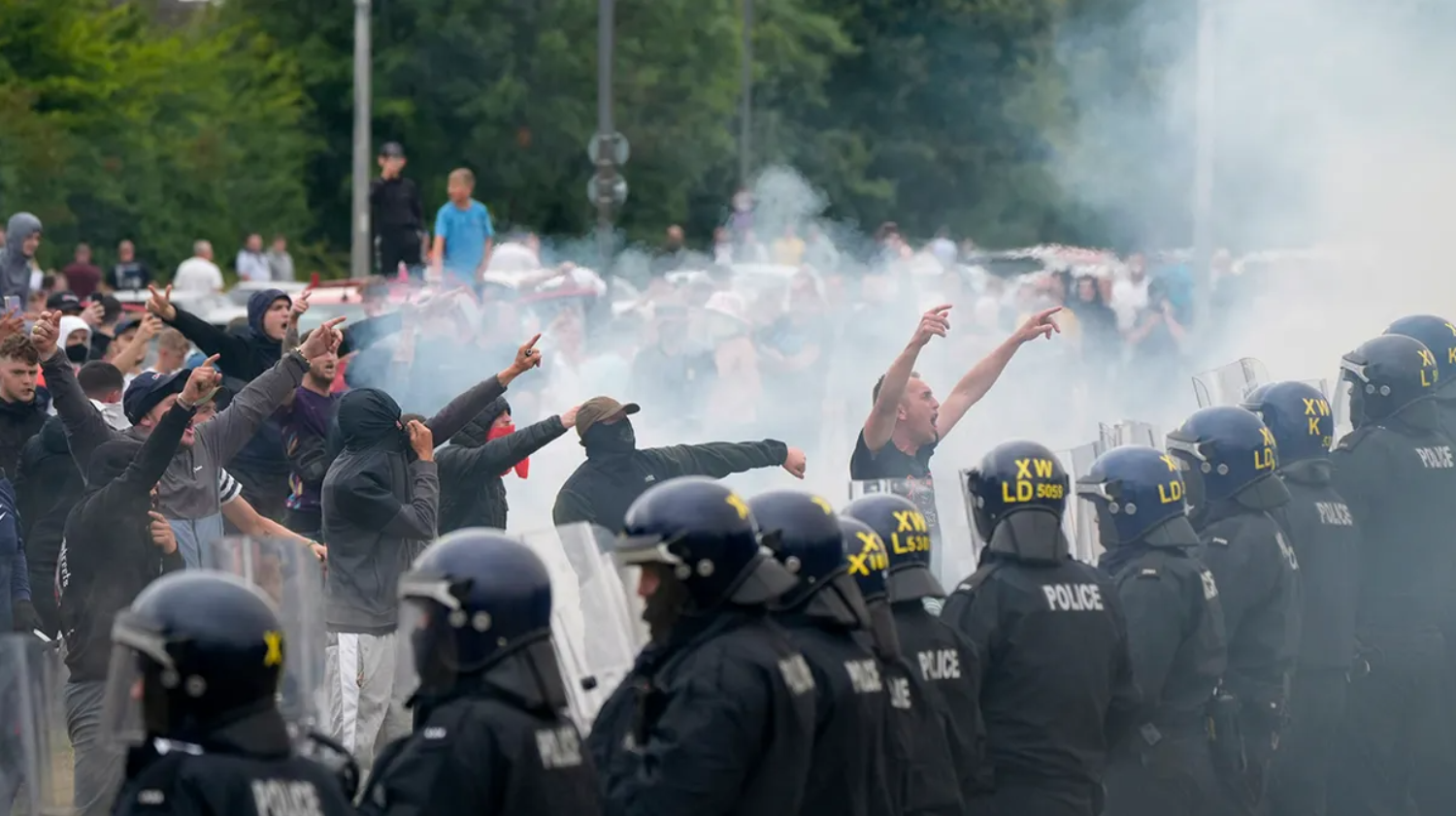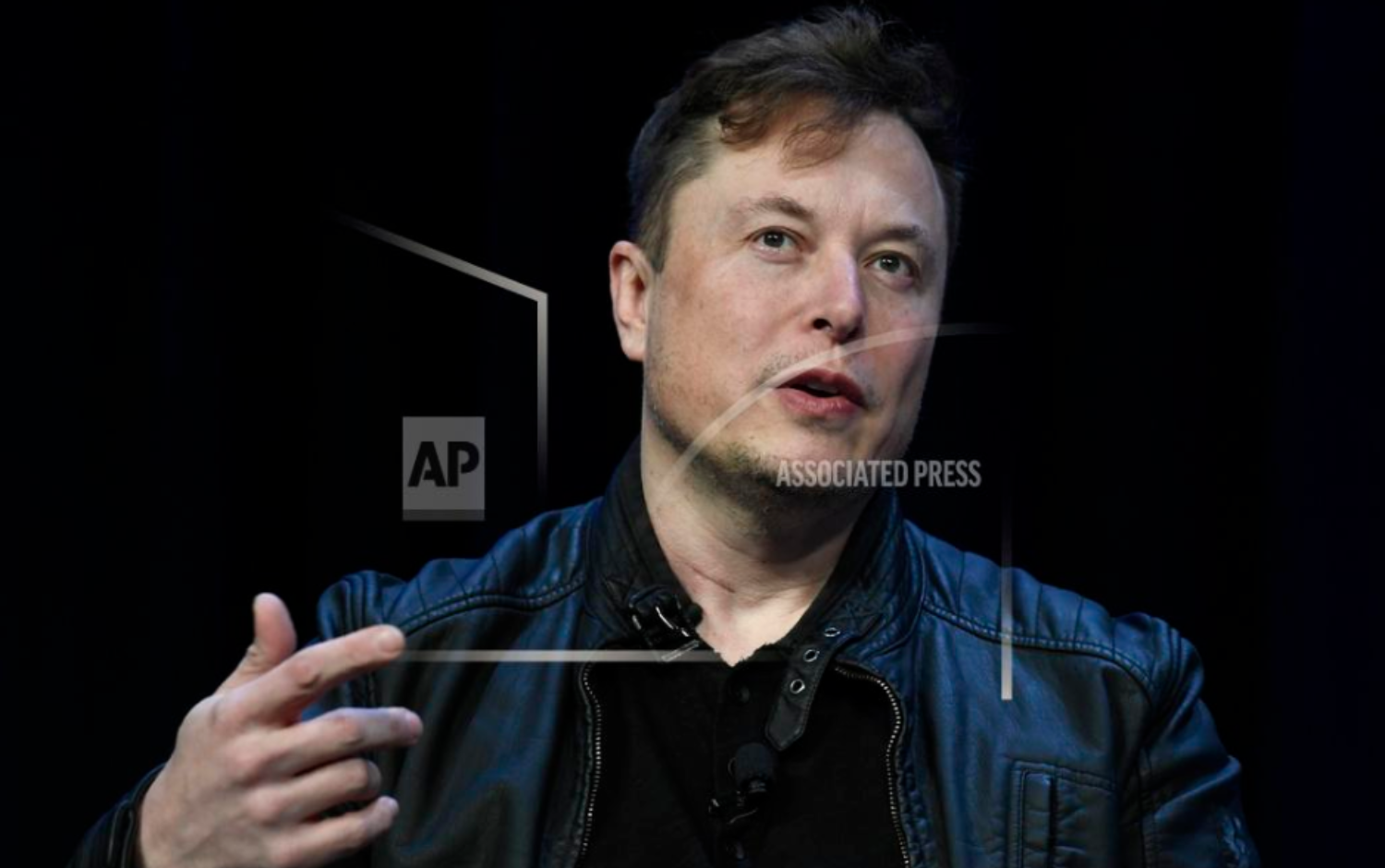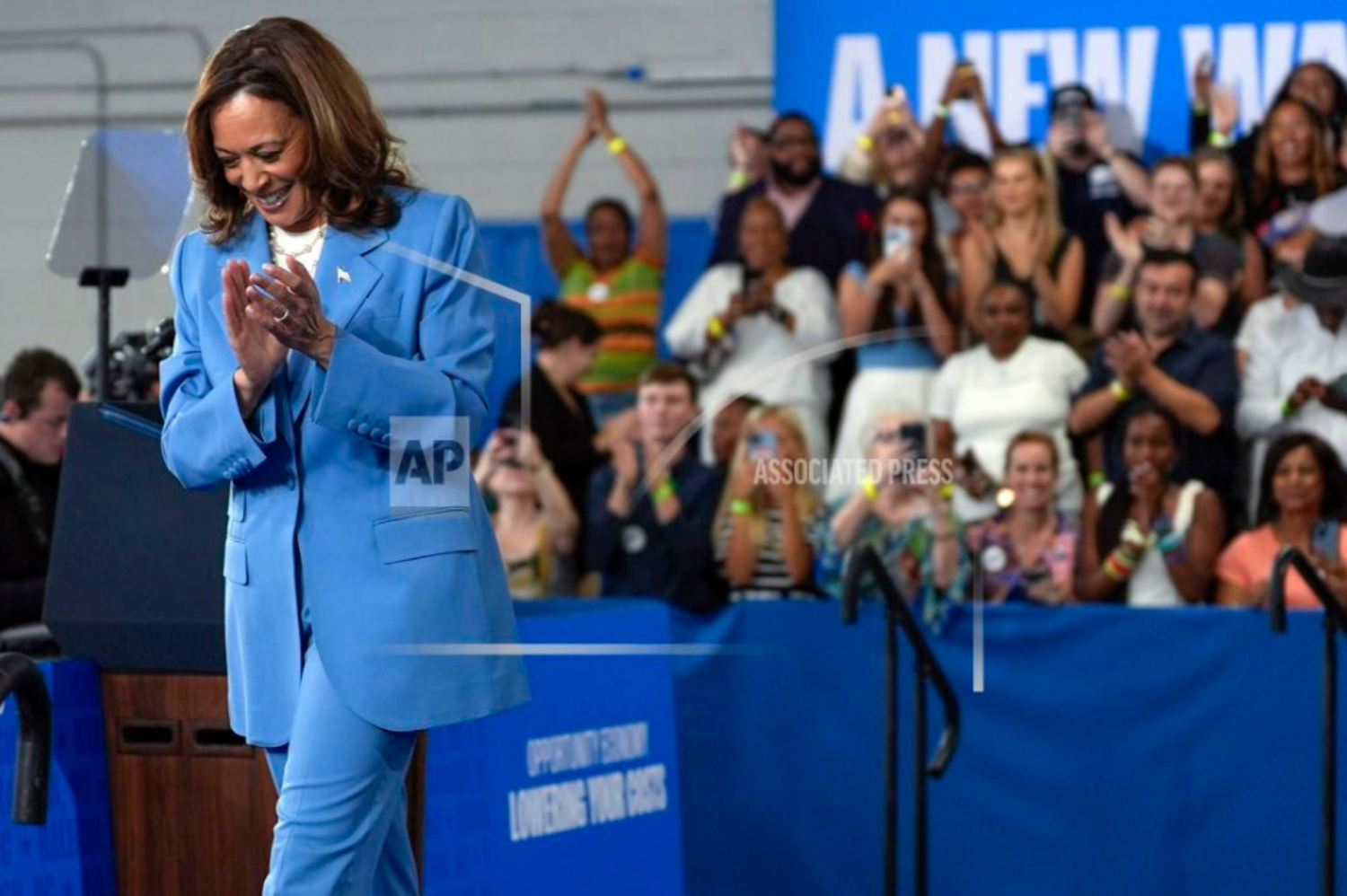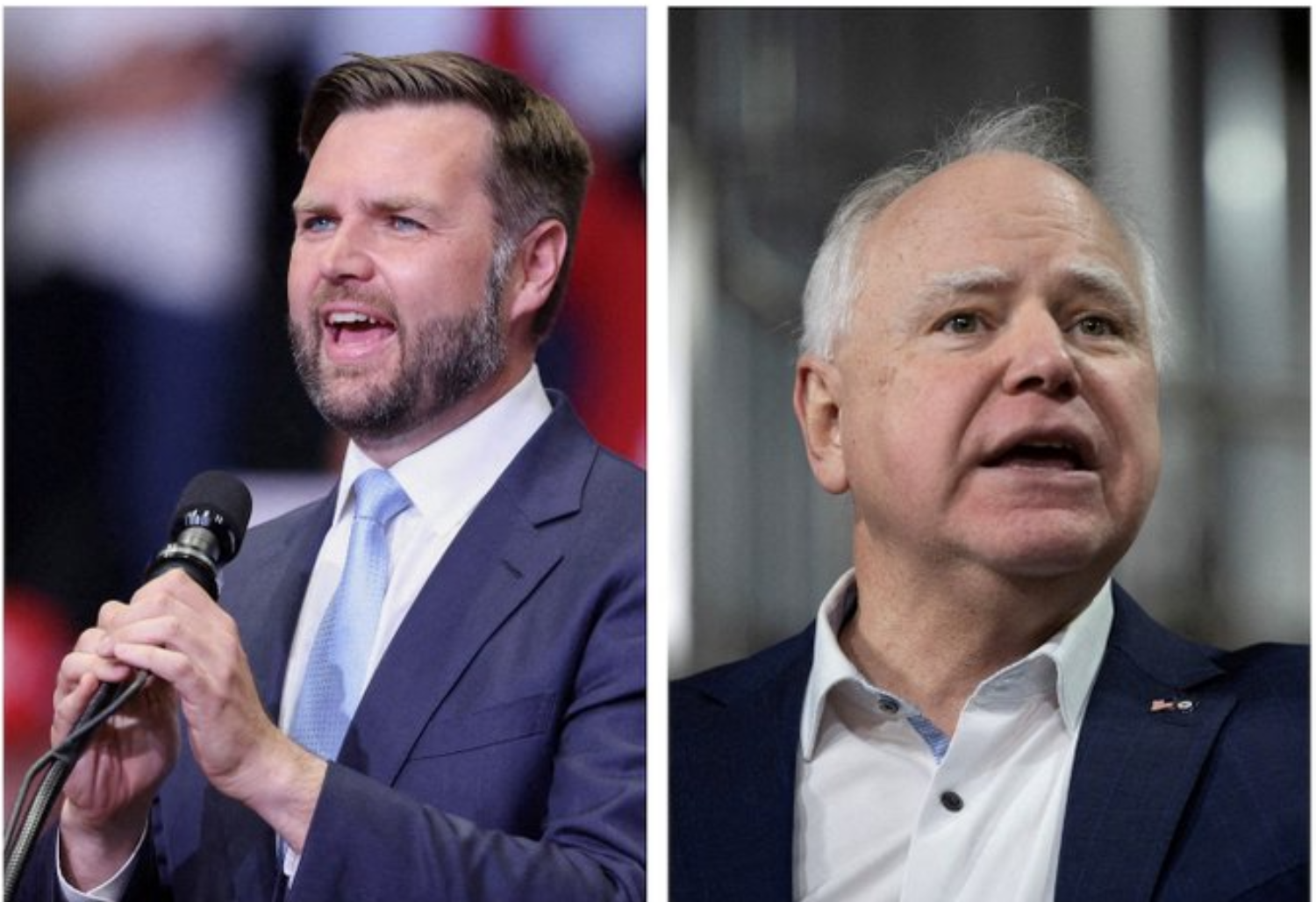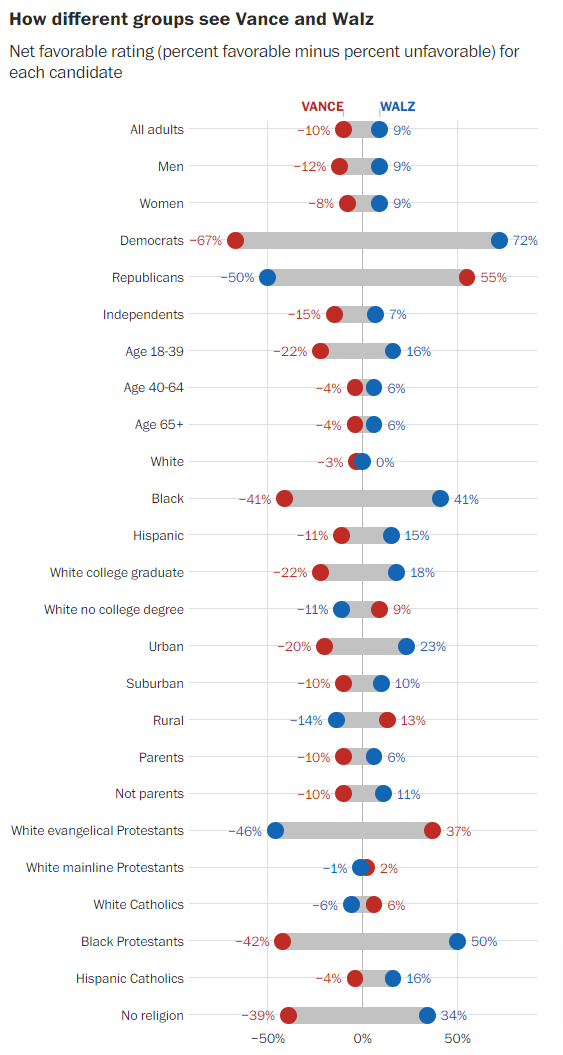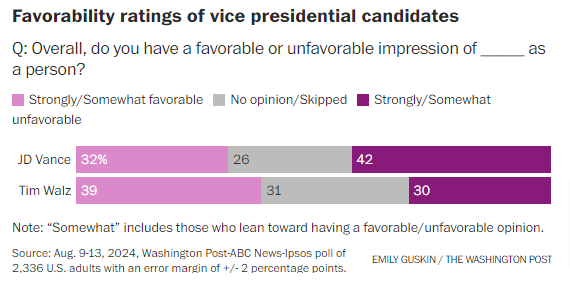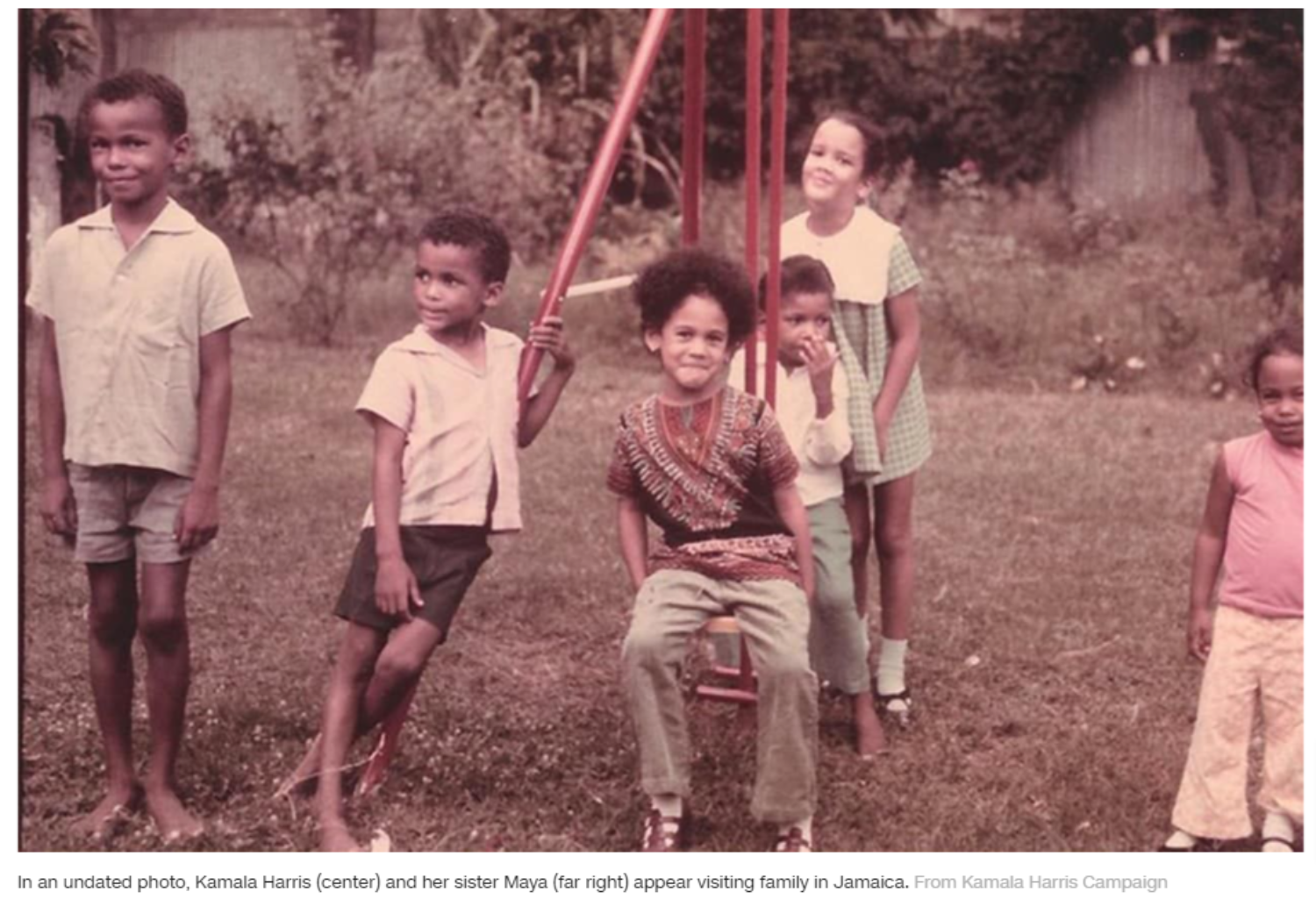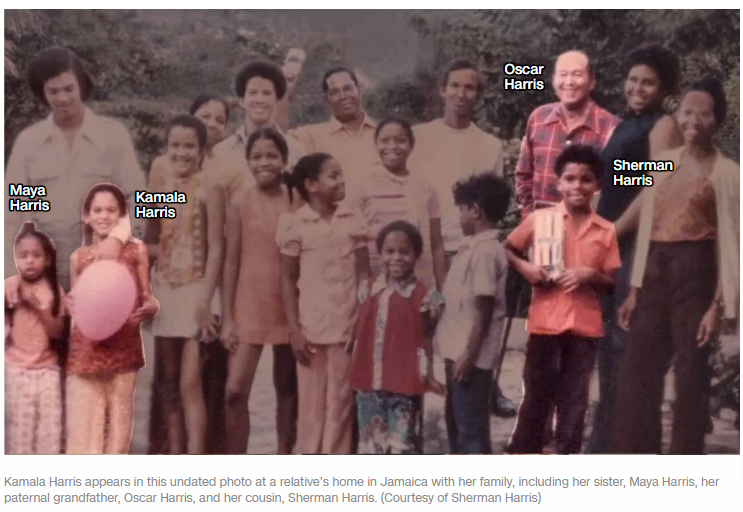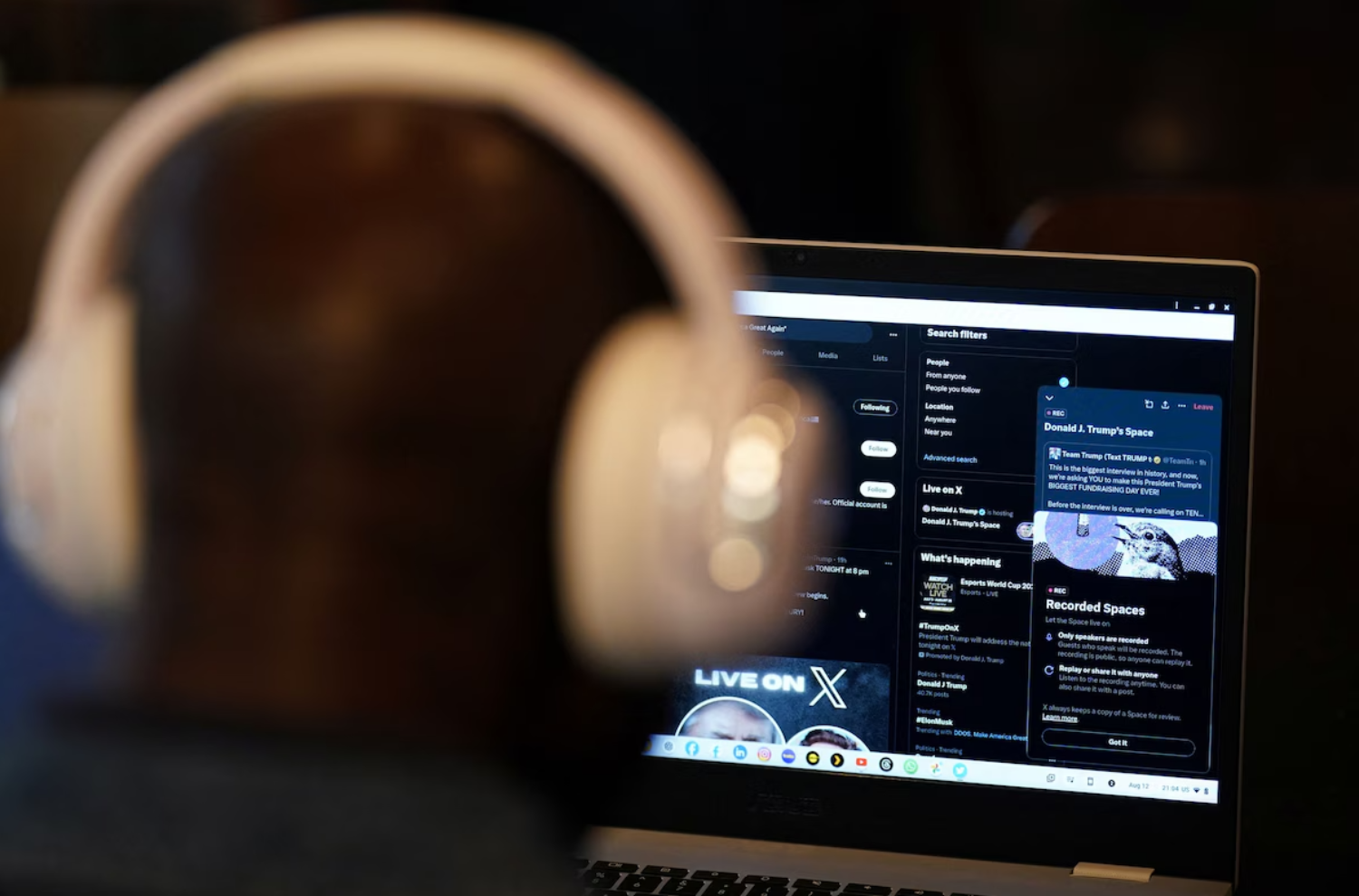-
Posts
10,090 -
Joined
-
Last visited
Content Type
Events
Forums
Downloads
Quizzes
Gallery
Blogs
Everything posted by Social Media
-
The Republican-led effort to impeach President Joe Biden has reached a quiet but inevitable conclusion, as the long-anticipated report from the House Judiciary, Oversight, and Ways and Means committees made it clear that the GOP lacks the necessary votes to proceed. The nearly 300-page report, released on Monday, details the findings of the impeachment inquiry, accusing Biden of engaging in what they termed "impeachable conduct." However, the report stops short of calling for an impeachment vote, leaving the decision to the wider GOP Conference. House Speaker Mike Johnson issued a statement shortly after the report's release, urging Americans to read the report and praising the committees for their work. Notably, Johnson's statement did not mention any next steps, a strong indication that the GOP leadership does not plan to bring an impeachment vote against Biden to the floor. Committee leaders such as Reps. Jim Jordan of Ohio and James Comer of Kentucky have also refrained from demanding an impeachment vote, signaling a broader acceptance within the party that the effort is effectively over. This marks an anti-climactic end to one of the party's most high-profile investigations during its narrow majority in the House. The outcome, however, was predictable: with a slim three-vote margin, it has been evident for months that House Republicans do not have the votes to impeach Biden. Even as investigators presented their findings in private briefings, centrists within the party expressed skepticism about the existence of clear evidence of a crime or impeachable offense. Acknowledging the political reality, one GOP lawmaker, speaking anonymously, admitted, "We don't have the votes. We won't have the votes. It's math. … The report is going to be the end of it." Despite the report's findings, some conservative members of the party continue to push for impeachment. Rep. Greg Steube of Florida took to social media to ask Speaker Johnson, "When are we voting to impeach Biden?" Similarly, Rep. Marjorie Taylor Greene of Georgia, who had previously suggested forcing a vote on impeaching Biden over border issues, reiterated in a statement that the president "must be impeached." She also voiced her frustration with Congress for not having already brought articles of impeachment against Biden. However, neither Greene nor Steube explicitly stated that they would force an impeachment vote when Congress reconvenes in early September, something they could do without the support of party leadership. Such a vote, though, is almost certain to fail, as GOP lawmakers estimate that many of their colleagues remain unconvinced of the need for impeachment. Some conservatives have floated the idea of holding a vote anyway, forcing their colleagues to take a public stand just weeks before the election, but the lack of broad support makes this an unlikely scenario. If the GOP does not proceed with an impeachment vote, it will be the first formal presidential impeachment inquiry in modern history to end without a vote, barring the case of Richard Nixon, who resigned before an impeachment vote could take place. This reality is something a growing number of Republicans appear willing to accept, as they explore other potential avenues to address their concerns. Among the alternatives being considered are criminal referrals to the Department of Justice for James and Hunter Biden, the president's brother and son, respectively. Additionally, some Republicans are pushing for bipartisan legislation to tighten financial disclosure requirements for presidents, vice presidents, and their family members. Rep. Tim Burchett of Tennessee encapsulated the current state of the impeachment effort, stating in a recent interview, "I'd say we're finished with that." Comer, one of the key figures in the investigation, has also distanced himself from the push for impeachment, noting that he "never asked" for an impeachment inquiry to be formally opened. Instead, he pointed out that former Speaker Kevin McCarthy believed it would help the GOP in court. Over the past several months, House Republicans have dedicated significant time and resources to their investigation, which has primarily focused on the business dealings of Biden's family members. A substantial portion of their report delves into the financial activities of Hunter and James Biden, including their business ventures and loans they received. The report claims that the Biden family and their associates received $27 million from foreign entities, which they argue would not have been possible without Joe Biden's political influence. However, investigators struggled to establish a direct link between Biden's actions as president or vice president and these business dealings, or to prove that he committed a crime. Some former business associates of Hunter Biden told investigators that Hunter would occasionally put his father on speakerphone during meetings with potential business partners, but they noted that these conversations were limited to pleasantries. In other instances, witnesses recalled Joe Biden making brief appearances at dinners or lunches, though they emphasized that no business was discussed during these encounters. Both Hunter and James Biden have consistently denied that Joe Biden was involved in their business deals, a stance that has been repeatedly echoed by the White House. In their report, GOP investigators argued that they did not need to provide evidence of a crime or a quid pro quo to justify impeachment. However, this position has not satisfied many of their Republican colleagues, who believe that more concrete evidence is necessary to move forward with impeachment. Meanwhile, Democrats quickly seized on the report's release, declaring that it effectively exonerated President Biden. Maryland Rep. Jamie Raskin, the top Democrat on the Oversight Committee, was quick to respond, stating, "The report they throw out into the world during an August congressional recess and at the start of the Democratic National Convention as a last-minute face-saving gesture is actually a Banana Republican cream pie they have just pressed into their own faces." Raskin also circulated a memo to Democratic members titled "President Biden Exonerated by Impeachment Inquiry," further solidifying the party's position that the report cleared Biden of any wrongdoing. GOP leaders have been working to defend their investigative efforts, with Speaker Johnson's office and various committees compiling a list of what they consider to be the investigative successes achieved during the GOP's majority in the House. These include pressuring then-Secret Service Director Kimberly Cheatle to resign in the wake of an assassination attempt against former President Donald Trump, as well as Judiciary Committee investigations into Vice President Kamala Harris' handling of border issues and resignations at Columbia University, which has been under investigation by the Committee on Education and the Workforce. The lack of votes is the primary reason behind the GOP's stalled momentum on impeachment, but there is also a shift in the party's political calculus. With Biden's decision to drop out of the presidential race, Republicans are increasingly directing their focus toward Vice President Kamala Harris and vice presidential candidate Tim Walz. The GOP has launched investigations into Harris' work on the border and recently initiated a probe into Walz's dealings related to China. Interestingly, the GOP's impeachment report mentions the "Biden-Harris" administration approximately 20 times, despite the fact that Harris was not the primary focus of the investigation, which largely centered on the business activities of Biden's family members and the federal investigation into Hunter Biden. The report's release also coincided with the first day of the Democratic National Convention, with Biden scheduled to speak later that evening. In the end, the impeachment inquiry into President Biden appears to be drawing to a close without the dramatic conclusion that many had anticipated. As Republicans grapple with the realities of their narrow majority and shifting political landscape, the focus is gradually shifting away from impeachment and toward other strategies to achieve their goals. Credit: Politico 2024-08-21 Get our Daily Newsletter - Click HERE to subscribe Cigna offers a variety of health insurance plans designed to meet the minimum requirement for medical treatment coverage, with benefits reaching up to THB 3 million. These plans are tailored to provide comprehensive healthcare solutions for expatriates, ensuring peace of mind and access to quality medical services. To explore the full range of Cigna's expat health insurance options and find a plan that suits your needs, click here for more information.
-
In a move that has sent shockwaves across the digital landscape of Russia, the Kremlin has begun shutting down access to YouTube, one of the last remaining platforms where independent voices could still be heard. The decision, while not entirely unexpected, has profound implications for a nation that has increasingly found itself isolated from the rest of the world, both culturally and politically. The timing of this move is telling. On August 11, 2024, the Olympic closing ceremony in Paris captivated the world, including many Russians who, despite the ongoing war with Ukraine and the new Cold War proclaimed by the Kremlin, were eager to watch the global event. The ceremony, which featured Hollywood star Tom Cruise descending from the top of the Stade de France to take the Olympic flag from gymnast Simone Biles, was particularly poignant for Russians due to their historic affection for Paris, a sentiment that dates back to the 19th century. Yet, due to the harsh reality of international sanctions and the isolationist policies of their government, Russian viewers had no official means of watching the event. Instead, millions turned to YouTube, as they have done for years. For people like 70-year-old Elena from Moscow, YouTube was a lifeline. She managed to catch most of the ceremony on her iPad, albeit with some delay, and it brought her a sense of connection to a world that is increasingly out of reach for many Russians. But almost immediately after the ceremony, the access that Elena and millions of others enjoyed was cut off as the Kremlin moved to block YouTube across the country. For Elena, who lacks the technical know-how to navigate around the restrictions with a VPN, this marked the end of her access to a window on the world. This crackdown on YouTube has been in the works for years. Vladimir Putin, Russia's president, simply cannot tolerate the existence of a platform that offers contradictory and widely available sources of information in an increasingly despotic state. This is not the first time the Kremlin has sought to control the flow of information to its citizens. In the early 2000s, television was seen as a powerful tool of mass communication, and the government kept it tightly under control as it was the most popular media and entertainment platform in the country. However, the landscape began to shift in the spring of 2017. That year, protests erupted across many Russian cities, sparked in part by a video about the corruption of then-Prime Minister Dmitri Medvedev. The video, produced by opposition leader Alexey Navalny's team, was posted on YouTube and watched over 20 million times. It galvanized a new generation of protesters, including teenagers, who took to the streets in unprecedented numbers. Suddenly, Russian-speaking YouTube had gone political, with well-known bloggers producing heavily political content and opposition politicians becoming some of the platform's most popular figures. As YouTube's influence grew, the influence of traditional television began to wane. By 2019, for the first time in Russian history, online advertising revenue overtook that of television. TV ad spending increased by 9% to 187 billion rubles ($2.1 billion), while Internet ad spending surged by 22% to 203 billion rubles. The shift was unmistakable, and even mainstream journalists began migrating to YouTube, a trend that was only accelerated by the COVID-19 pandemic. During the lockdowns, the demand for Russian-language content on YouTube skyrocketed. By the time the pandemic struck, the Kremlin had already been working for two years on a new censorship system designed to deal with the perceived threat posed by YouTube. This system, known as the Sovereign Internet, was composed of several elements. The first involved providing Russian Internet service providers with special equipment that allowed censors to suppress and redirect traffic across the country from a central point in Moscow. As the situation evolves, the impact on Russian society and the response of the nearly 100 million users who relied on YouTube will be critical to watch, as it could lead to further resistance against the government's tightening grip on information. Credit: CEPA 2024-08-21 Get our Daily Newsletter - Click HERE to subscribe Cigna offers a variety of health insurance plans designed to meet the minimum requirement for medical treatment coverage, with benefits reaching up to THB 3 million. These plans are tailored to provide comprehensive healthcare solutions for expatriates, ensuring peace of mind and access to quality medical services. To explore the full range of Cigna's expat health insurance options and find a plan that suits your needs, click here for more information.
-
In 2020, during his campaign for the presidency, Joe Biden made a bold pledge at a New Hampshire town hall, vowing to bring an end to drilling on federal lands. With deliberate emphasis, he stated, "No more drilling on federal lands. Period. Period. Period. Period." However, nearly four years later, the reality of his presidency tells a different story. Under Biden's leadership, the United States is now producing more oil than any other country ever has, and his administration has approved more drilling permits on public lands than his predecessor, Donald Trump. This unanticipated boom in fossil fuel production reveals a challenging truth for both Biden and Vice President Kamala Harris: it is nearly impossible for any U.S. president to significantly curb oil production, a key driver of both the economy and climate change. As Jason Bordoff, founding director of the Center on Global Energy Policy at Columbia University, aptly observed, "If you were to show someone who came from Mars the line of U.S. oil and gas production over the last 15 years, they probably would not be able to tell whether a Republican or Democrat was in the White House." Despite Biden's earlier promises, his administration's actions have continued to fuel the U.S. oil boom, with the country expected to produce an average of 13.2 million barrels of oil per day this year—surpassing both Saudi Arabia and Russia. This surge in production, while beneficial for the economy in the short term, has complicated Biden's broader climate agenda, which aims to transition the nation away from fossil fuels. Even Biden's landmark 2022 climate legislation, the Inflation Reduction Act, which has significantly boosted the production of renewable energy sources such as solar and wind, has not been enough to offset the continued dominance of oil. The challenges Biden has faced in trying to reduce the nation's reliance on fossil fuels stem from a combination of legal obligations, political pressures, and market forces. In June 2021, a federal judge struck down Biden's attempt to pause oil and gas leasing on federal lands, a policy move that had been challenged by Republican-led states. Then, in February 2022, Russia's invasion of Ukraine further complicated the situation by disrupting global energy markets, leading to higher fuel prices and record profits for oil companies. These obstacles highlight the difficulties Harris would likely encounter if she were to win the presidency in the next election. Although some former administration officials suggest that Harris could avoid what they view as Biden's strategic missteps, the reality is that any president will face significant challenges in trying to reduce U.S. oil production. As one former administration official noted, Biden's early pledge of no more drilling was "an early strategic mistake because it set expectations in a way that was not going to be achievable legally and politically." Despite these challenges, Biden's administration has defended its record on fossil fuels. John D. Podesta, senior adviser to the president for international climate policy, emphasized that the surge in U.S. oil production is largely a "market-driven phenomenon" that has short-term economic benefits, even as the country works toward a long-term transition away from fossil fuels. "On the gas side, I think it was important that we could supply our friends and allies in Europe after the illegal invasion of Ukraine and cutoff of Russian sources of supply," Podesta said. "On the oil side, we continue to benefit from production and the effect that it has on stabilizing prices around the world." Anne Bradbury, CEO of the American Exploration and Production Council, a trade group representing independent oil and gas companies, pointed out that much of the record production seen today is the result of policies enacted by previous administrations, both Republican and Democrat. However, on the campaign trail, Trump has framed the current boost in oil production as a Democratic tactic to lower gasoline prices ahead of the election. "Now [Biden’s] drilling like crazy," Trump claimed at a rally in March. "He went back to my policy. You know why? Because it was up to $6, $7, $8 a gallon. … They allowed them to continue drilling, but the day after the election, it’s over." The limitations of any administration's control over oil production are evident when considering the legal and logistical constraints involved. While the federal government can regulate drilling on federal lands and waters, it has no authority over drilling on private or state lands, which include some of the largest shale deposits in the country, such as those in the Permian Basin in West Texas. Moreover, even on federal lands, there is a two-step process for oil and gas production: first, the administration must decide whether to auction off new lands for leases, and then it must issue permits for the actual drilling to begin. Biden's administration has faced significant legal challenges in trying to stem new leases on public lands. The pause on leasing that Biden attempted to implement early in his presidency was struck down by U.S. District Judge Terry A. Doughty, a Trump appointee, who ruled that the administration could not stop leasing without congressional approval. Since then, the Interior Department has resumed quarterly lease sales, although it has auctioned off fewer acres overall compared to the Trump administration. During Biden's first three years in office, the Bureau of Land Management leased 232,630 acres, a steep decline from the more than 5 million acres leased during Trump's first three years. Despite the administration's efforts to limit new leasing, the approval of drilling permits has continued, largely due to legal requirements. "The fact is that President Biden has followed the rule of law in this country, and the rule of law says that if you have already given a lease to a fossil fuel company, you have to give a permit," explained Leah Stokes, an associate professor of environmental politics at the University of California at Santa Barbara. The political realities surrounding gas prices have further complicated Biden's efforts to reduce fossil fuel dependence. High gas prices are a political liability for any president, and Biden has taken steps to address rising fuel costs even when those actions seem to contradict his climate goals. For instance, in late 2021, as gas prices climbed above $3.30 a gallon nationwide, Biden urged major oil-producing countries to ramp up production. This move, while intended to alleviate economic pain at the pump, drew criticism for its perceived inconsistency with Biden's climate messaging. The invasion of Ukraine by Russian forces in 2022 further intensified the pressures on the administration. In response to the crisis, Biden released 30 million barrels of oil from the Strategic Petroleum Reserve and pledged to supply the European Union with natural gas to help offset the bloc's reliance on Russian energy. These actions, while necessary in the short term, highlighted the ongoing tension between maintaining energy security and pursuing aggressive climate goals. If elected, Harris would inherit the same challenges that have plagued the Biden administration. Experts suggest that Harris's campaign has already learned from some of Biden's mistakes, particularly in avoiding climate promises that are not politically or legally feasible. For example, after Trump and other Republicans attacked Harris for supporting a ban on fracking in 2019, her campaign clarified that she would not seek to ban fracking if elected president. The impact of Biden's climate policies may become more evident in the coming years, particularly if Harris continues on a similar path. Prolonging Biden's strict limits on emissions from cars and trucks, for instance, could accelerate the adoption of electric vehicles, which do not rely on gasoline or diesel. Washington Governor Jay Inslee, whose climate proposals during his 2020 presidential campaign influenced Biden's policies, noted that a Harris administration could focus on expanding renewable energy, gradually reducing the nation's reliance on fossil fuels. "This is not an instant transition," Inslee said. "We don’t flip a switch and totally eliminate fossil fuels. It’s a thermostat. And to turn down that thermostat, you need to have as aggressive a development of non-fossil-based sources as possible." In conclusion, while Biden's presidency has seen record levels of oil production despite his climate-focused campaign promises, the complexities of legal obligations, political realities, and market demands have made it difficult to significantly slow the U.S. oil boom. As Harris looks ahead to a potential presidency, she faces the challenge of navigating these same obstacles while trying to advance a more sustainable energy future. The tension between economic imperatives and environmental goals will likely continue to shape U.S. energy policy for years to come. Credit: W.P. 2024-08-21 Get our Daily Newsletter - Click HERE to subscribe Cigna offers a variety of health insurance plans designed to meet the minimum requirement for medical treatment coverage, with benefits reaching up to THB 3 million. These plans are tailored to provide comprehensive healthcare solutions for expatriates, ensuring peace of mind and access to quality medical services. To explore the full range of Cigna's expat health insurance options and find a plan that suits your needs, click here for more information.
-
2024-08-21 Get our Daily Newsletter - Click HERE to subscribe Cigna offers a variety of health insurance plans designed to meet the minimum requirement for medical treatment coverage, with benefits reaching up to THB 3 million. These plans are tailored to provide comprehensive healthcare solutions for expatriates, ensuring peace of mind and access to quality medical services. To explore the full range of Cigna's expat health insurance options and find a plan that suits your needs, click here for more information.
-
U.S. Secretary of State Antony Blinken announced on Monday that Israel has accepted a U.S.-backed proposal designed to bridge the differences obstructing a cease-fire and the release of hostages in Gaza. In his statement, Blinken urged Hamas to agree to the proposal as well, though he did not clarify whether the concerns raised by the militant group had been addressed. The ongoing negotiations have taken on increased urgency in recent days, with diplomats hoping to avert potential retaliation from Iran and Lebanon’s Hezbollah following the targeted killings of two senior militants, actions attributed to Israel. The rising tensions have fueled fears of a broader, more destructive regional conflict. Blinken made his remarks after a two-and-a-half-hour meeting with Israeli Prime Minister Benjamin Netanyahu. Following this, he is scheduled to travel to Egypt and Qatar for further negotiations. The three mediators have been engaged in efforts to end the conflict in Gaza for months, but the talks have frequently hit roadblocks. “In a very constructive meeting with Prime Minister Netanyahu today, he confirmed to me that Israel supports the bridging proposal,” Blinken told reporters, although he did not elaborate on the specifics of the proposal. “The next important step is for Hamas to say ‘yes.’” However, Blinken added that even if Hamas agrees to the proposal, negotiators would need to spend the coming days working on “clear understandings on implementing the agreement.” He emphasized that there are still “complex issues” that require “hard decisions by the leaders,” but did not provide further details. Hamas, on the other hand, has expressed growing frustration with the United States as a mediator, accusing American negotiators of favoring Israel, which has reportedly made new demands that the militant group finds unacceptable. Blinken did not comment on whether the proposal addressed Israel’s demand for control over two strategic corridors inside Gaza—an issue Hamas has categorically rejected—or other contentious matters that have complicated the negotiations. Prime Minister Netanyahu described his meeting with Blinken as “good and important,” expressing appreciation for “the understanding that the United States has shown to our vital security interests, along with our shared efforts to release our hostages.” He also mentioned that efforts are being made to release the maximum number of hostages in the initial stage of the cease-fire agreement. This marks Blinken’s ninth diplomatic mission to the Middle East since the conflict began. His visit comes just days after mediators, including the United States, voiced renewed optimism that a deal was within reach. However, Hamas has conveyed deep dissatisfaction with the latest proposal, while Israel has indicated that there are certain points on which it is unwilling to compromise. Earlier on Monday, Blinken emphasized that this was a “decisive moment,” potentially the last opportunity to secure a cease-fire and free the hostages. He stressed the importance of ensuring that no one takes actions that could derail the process, indirectly referencing Iran. “It’s also time to make sure that no one takes any steps that could derail this process,” Blinken said. “And so we’re working to make sure that there is no escalation, that there are no provocations, that there are no actions that in any way move us away from getting this deal over the line, or for that matter, escalating the conflict to other places and to greater intensity.” The mediators are expected to meet again this week to solidify the cease-fire agreement. Blinken’s diplomatic journey will continue on Tuesday with visits to Egypt and Qatar, where Hamas maintains a political office. Credit: PBS 2024-08-20 Get our Daily Newsletter - Click HERE to subscribe Cigna offers a variety of health insurance plans designed to meet the minimum requirement for medical treatment coverage, with benefits reaching up to THB 3 million. These plans are tailored to provide comprehensive healthcare solutions for expatriates, ensuring peace of mind and access to quality medical services. To explore the full range of Cigna's expat health insurance options and find a plan that suits your needs, click here for more information.
-
Former President Donald Trump launched a scathing attack on Vice President Kamala Harris, labeling her economic proposals as a "full Communist" agenda during a rally in Wilkes-Barre, Pennsylvania. The Republican presidential nominee criticized Harris’s recent announcement of policies aimed at combating inflation, accusing her of pushing the United States toward a dangerous path reminiscent of failed communist regimes. Speaking to a packed audience at the Mohegan Sun Arena at Casey Plaza, Trump did not hold back in his condemnation of Harris's plans. “In her speech yesterday, Kamala went full Communist,” Trump declared, referring to Harris by the nickname "Comrade Kamala." He argued that her approach to managing the economy, particularly her proposal to impose socialist price controls on groceries, is a direct threat to the nation’s well-being. “She wants to destroy our country. After causing catastrophic inflation, Comrade Kamala announced that she wants to institute socialist price controls,” Trump asserted, drawing parallels between Harris’s proposals and the economic policies that led to disaster in countries like Venezuela and the former Soviet Union. The controversy began when Harris, during a rally in North Carolina, outlined her economic vision for her first 100 days as president. Her plan, aimed at addressing the rising cost of living, includes measures to crack down on price gouging, a practice where companies exploit market conditions to charge exorbitantly high prices for goods. Under her proposal, the Federal Trade Commission would be empowered to enforce a federal ban on price gouging, imposing hefty penalties on companies found guilty of the practice. Trump seized on these proposals, warning his supporters that Harris’s policies could have dire consequences. “What they are doing is a communist takeover of our country,” he proclaimed, further criticizing the plan as not just Communist but also Marxist and fascist. According to Trump, while Harris's ideas might seem appealing on the surface, they are ultimately “very dangerous because it may sound good politically … This is Communist; this is Marxist; this is fascist.” Trump’s remarks reflect his broader strategy of portraying Harris and the Biden administration as proponents of extreme left-wing policies that threaten American freedoms. He framed Harris’s proposals as part of a larger effort by the administration to undermine the free market and impose government control over various aspects of life. In a rare moment of agreement with a media outlet often critical of him, Trump took a few moments during his speech to praise The Washington Post. The left-leaning newspaper had published an editorial criticizing Harris for her stance on price gouging, accusing her of offering “populist gimmicks” rather than legitimate solutions to address inflation. Trump seized on this editorial as evidence that even some in the mainstream media are beginning to see flaws in Harris’s economic approach. The rally in Wilkes-Barre marked Trump’s seventh appearance in Pennsylvania this year, a key battleground state that could play a crucial role in the upcoming presidential election. Recent polls indicate that Pennsylvania’s 19 electoral votes are up for grabs, with Trump and Harris locked in a tight race. Trump's frequent visits to the state underscore its importance in his campaign strategy as he seeks to mobilize his base and sway undecided voters. The stark contrast between Trump’s and Harris’s economic visions highlights the broader ideological divide in the upcoming election. Trump’s criticisms of Harris are likely to resonate with his supporters, who have long viewed him as a staunch defender of free-market capitalism and a bulwark against socialism. By framing Harris’s policies as a threat to the American way of life, Trump is attempting to galvanize voters who fear the encroachment of government control over the economy. On the other hand, Harris’s proposals reflect a different approach to governance, one that seeks to address economic inequality and protect consumers from corporate exploitation. Her emphasis on cracking down on price gouging is likely to appeal to voters who are struggling with the rising cost of living and who believe that the government should play a more active role in regulating the economy. As the election season intensifies, the debate over economic policy is expected to remain a central issue, with both candidates seeking to define the future direction of the country. Trump’s fiery rhetoric and stark warnings about the dangers of communism are likely to continue to be a key part of his campaign strategy as he seeks to win over voters in critical swing states like Pennsylvania. In the coming months, the contrast between Trump’s free-market advocacy and Harris’s proposals for greater government intervention in the economy will likely shape the political discourse. With the stakes high and the outcome uncertain, the battle for Pennsylvania’s electoral votes will be closely watched as a bellwether for the national election. Credit: NYP 2024-08-20 Get our Daily Newsletter - Click HERE to subscribe Cigna offers a variety of health insurance plans designed to meet the minimum requirement for medical treatment coverage, with benefits reaching up to THB 3 million. These plans are tailored to provide comprehensive healthcare solutions for expatriates, ensuring peace of mind and access to quality medical services. To explore the full range of Cigna's expat health insurance options and find a plan that suits your needs, click here for more information.
-
As the Democratic National Convention opens this week in Chicago, a significant challenge looms that threatens to overshadow the intended unity around Vice President Kamala Harris's nomination for president. While the convention is expected to be a celebration of Harris’s candidacy, following President Joe Biden's unexpected exit from the race in July, tensions within the party regarding the conflict in Gaza may disrupt the anticipated harmony. The Harris campaign has high hopes that the convention will solidify her position as the Democratic nominee and energize the party base ahead of the November election, now just under 80 days away. The convention is set to culminate on Thursday with a primetime speech by Harris, where she will formally accept the party’s nomination. Joining her will be prominent Democratic figures such as President Joe Biden, former Secretary of State Hillary Clinton, former President Barack Obama, and a lineup of celebrities who will take the stage at the United Center in Chicago to support Harris and deliver sharp critiques of her Republican challenger, former President Donald Trump. Despite these efforts to present a united front, the question of how the Harris campaign and the broader Democratic Party will address the sensitive issue of U.S. policy towards Israel and the ongoing conflict in Gaza remains uncertain. The Harris campaign has not responded to requests for comment on this issue, leaving many to speculate on the direction her campaign might take. The conflict in Gaza escalated dramatically on October 7 when Hamas launched a devastating attack on southern Israel, resulting in approximately 1,200 deaths and 251 hostages taken. In response, Israel initiated a military campaign aimed at dismantling Hamas, leading to significant civilian casualties. Gaza's Hamas-run health ministry reports that more than 40,000 people have been killed since the conflict began. While Harris embarked on a bus tour of Western Pennsylvania before heading to Chicago, she has yet to articulate a comprehensive policy on Gaza and Israel. Her campaign has primarily focused on economic proposals, but there is growing demand for her to outline her broader policy agenda. Harris has called for a ceasefire and hostage release along with emphasizing the importance of treating protesters with respect at her rallies. She also acknowledged that "far too many" civilians have been killed in the conflict. The Biden administration's handling of the conflict has already sparked dissatisfaction within the Democratic Party. More than 750,000 voters cast "uncommitted" ballots during the Democratic presidential primary earlier this year, rather than supporting any specific candidate, reflecting frustration with the administration's stance. This "uncommitted" vote, concentrated in key swing states like Michigan, poses a potential risk to Democratic unity as the convention unfolds. Although only a small number of delegates at the convention will represent the "uncommitted" vote, their presence is significant. These delegates, many of whom are experienced Democratic organizers, aim to pressure the Harris campaign and the party leadership to adopt a stronger position on Gaza. "We know that this is not a small endeavour. We are challenging a status quo US policy of the past 40 years, and it won’t shift overnight," said Samuel Doten, an "uncommitted" delegate and Democratic organizer. Some "uncommitted" delegates are working to gather support for a letter demanding that Harris and the Democratic Party endorse a ceasefire and impose an arms embargo against Israel. These delegates emphasize that their goal is not to disrupt the convention or the upcoming election, but rather to push for a policy that they believe aligns with the views of many Democratic voters. "There are thousands of voters across the US who voted 'uncommitted,' so it feels like a huge responsibility for us to present their wishes and to make sure that their voices are being heard and amplified in this party," said Adrita Rahman, an "uncommitted" delegate attending the DNC for the first time. The scale and organization of protests during the convention remain uncertain. The largest demonstration is expected on Monday, with organizers predicting "many thousands of people" will participate. Earlier estimates suggested that as many as 100,000 protesters could take to the streets, but this figure has since been revised down to "many, many thousands" for the Gaza demonstration on Monday and "tens of thousands" by the end of the week. Harris initially garnered some support from Gaza protesters by being one of the first members of the Biden administration to call for a ceasefire and adopt a more critical stance towards Israel and Prime Minister Benjamin Netanyahu. However, this goodwill appears to be fading, with many protesters and delegates expressing disappointment at the lack of a concrete policy position from Harris. "I think the people inside the DNC need to know that they have some very unpopular policies. We're here to tell them," said protester Irene Alikakos during the week's first protest on Sunday, which saw a few hundred people gather near Chicago's Trump Tower. This protest occurred just before President Biden delivered his primetime address, in which he is expected to highlight his accomplishments and stress the importance of the upcoming election. The timing of the DNC also coincides with a crucial week for U.S.-mediated ceasefire talks, a key initiative in the final months of the Biden administration. Secretary of State Antony Blinken arrived in Israel on Sunday and is scheduled to continue to Cairo, where a decision on the ceasefire talks is anticipated. The Biden White House has indicated that the negotiations are in their "final" stages, adding further complexity to Harris's position. As a current member of the U.S. administration, Harris faces significant challenges in diverging from President Biden’s position on Gaza, particularly with the ceasefire talks nearing a conclusion. Some of Harris's close advisors suggest that a significant policy shift is unlikely. Halie Soifer, who served as Harris's national security adviser in the Senate and now leads the Jewish Democratic Council of America, stated that there is "no daylight between” Harris’s views and Biden’s. "Her policy, which is the policy of this White House, is not changing," Soifer said. In the coming days, the Democratic National Convention will serve as both a platform for unity and a test of how the party navigates internal divisions over one of the most contentious issues in American foreign policy. Whether the Harris campaign can maintain the party's cohesion while addressing the deep concerns of its progressive wing remains to be seen. As the convention unfolds, the Democratic Party faces the challenge of presenting a united front in the face of growing dissent over its approach to the Gaza conflict. Credit: BBC 2024-08-20 Get our Daily Newsletter - Click HERE to subscribe Cigna offers a variety of health insurance plans designed to meet the minimum requirement for medical treatment coverage, with benefits reaching up to THB 3 million. These plans are tailored to provide comprehensive healthcare solutions for expatriates, ensuring peace of mind and access to quality medical services. To explore the full range of Cigna's expat health insurance options and find a plan that suits your needs, click here for more information.
-
The UK government is set to introduce a significant shift in its approach to combating extremism by treating extreme misogyny as a form of extremism. This decision reflects growing concerns over the increasing prevalence of harmful ideologies targeting women. The Home Office announced that this new direction will be a key component of a broader review of the UK’s counter-extremism strategy, which has been ordered by Home Secretary Yvette Cooper. In light of escalating threats both online and in public spaces, Cooper has emphasized the urgent need to reassess and strengthen measures to counter extremism in the UK. “There has been a rise in extremism both online and on our streets that frays the very fabric of our communities and our democracy,” Cooper stated. This review will not only address Islamist and far-right extremism, which have long been recognized as significant threats, but will also delve into newer, less traditional forms of extremism, including extreme misogyny. The rise of extreme misogyny, often propagated through online platforms, has become a growing concern for the UK government. The analysis aims to understand and counteract this trend, viewing it as an ideological movement gaining disturbing traction. By examining the causes and methods of radicalization, particularly among young people, the government hopes to develop more effective strategies to disrupt and divert individuals away from these harmful ideologies. The review will play a crucial role in shaping a new counter-extremism strategy, which was a promise made in Labour’s manifesto. The strategy aims to "map and monitor extremist trends" in order to effectively combat them. Cooper highlighted the importance of this approach, noting that the strategy will also “identify any gaps in existing policy which need to be addressed to crack down on those pushing harmful and hateful beliefs and violence.” She expressed concern that efforts to tackle extremism have been “badly hollowed out” in recent years, suggesting that more robust and comprehensive measures are now urgently needed. This initiative comes as part of a broader set of policy reviews that the Labour government has launched since taking office in July. Among these are the Strategic Defence Review, a spending review, and a review of the National Curriculum. The government’s critics may argue that these reviews are a way to delay actual action, but Labour has defended the need for them, pointing out that the last Counter-Extremism Strategy was introduced in 2015. Since then, the landscape of extremism has evolved, with new and emerging threats requiring careful assessment and a targeted response. The decision to classify extreme misogyny as a form of extremism is not entirely new. There has been growing concern in recent years about “Incel culture,” a disturbing online movement composed primarily of young men who describe themselves as “involuntarily celibate.” Members of this group often direct their anger and frustration at women and “alpha males,” whom they blame for their own difficulties in forming relationships. This toxic ideology has already had tragic consequences. One of the most shocking incidents linked to Incel ideology occurred in 2021 in Plymouth, where 22-year-old Jake Davison carried out a mass shooting, killing five people before taking his own life. The attack sent shockwaves through the UK, prompting calls for a more aggressive stance against misogynistic extremism. Despite the severity of the incident, no significant policy changes were made at the time. The recent rise of social media influencers, such as Andrew Tate, who openly espouses misogynistic views, may have further motivated the government to revisit the issue. Tate’s influence over a large online following, particularly among young men, has raised alarms about the normalization of extreme misogynistic views and the potential for such beliefs to incite violence. As the review progresses, the UK government aims to ensure that its counter-extremism strategy is comprehensive and responsive to the evolving nature of extremist threats. The decision to include extreme misogyny in the scope of this strategy reflects a broader understanding of extremism that goes beyond traditional categories. The review is expected to be completed by October, and its findings will inform the new counter-extremism strategy that Labour has pledged to implement. This move to address extreme misogyny as a form of extremism marks a significant step forward in the UK’s efforts to combat all forms of hatred and violence. It underscores the government’s commitment to protecting the fabric of society from the corrosive effects of extremist ideologies, whether they are rooted in religious fanaticism, far-right nationalism, or entrenched misogyny. Credit: BBC 2024-08-20 Get our Daily Newsletter - Click HERE to subscribe Cigna offers a variety of health insurance plans designed to meet the minimum requirement for medical treatment coverage, with benefits reaching up to THB 3 million. These plans are tailored to provide comprehensive healthcare solutions for expatriates, ensuring peace of mind and access to quality medical services. To explore the full range of Cigna's expat health insurance options and find a plan that suits your needs, click here for more information.
-
Prince William has reportedly expressed a desire for his younger brother, Prince Harry, to be absent from his future coronation. According to a recent article in The Sunday Times, published in honor of Prince Harry’s upcoming 40th birthday in September, the Duke of Cambridge does not wish for Harry to attend the ceremony that will mark his ascension to the throne following the death of their father, King Charles III. At 42 years old, Prince William is preparing for his eventual role as king, and it appears he wants his crowning to be distinct from past ceremonies. As sources close to William suggest, this could include excluding Prince Harry from the event. “They are estranged, which is dreadfully sad,” shared one of the brothers’ closest friends. This statement underscores the deep rift between the two, who reportedly have not spoken in nearly two years. The tension between William and Harry has been public knowledge for some time, particularly after Harry and his wife, Meghan Markle, made the decision to step down from their roles as senior royals in 2020. Following their move to California, Harry and Meghan aired grievances against the royal family in various public forums, including a high-profile interview with Oprah Winfrey in 2021, their Netflix docuseries "Harry & Meghan," and Harry’s memoir "Spare." These revelations have only deepened the divide between Harry and his family, particularly with William and their father, King Charles III. The strain on Harry’s relationship with the royal family extends beyond his brother. King Charles, who assumed the throne after Queen Elizabeth II’s death in 2022, reportedly struggles with how to rebuild trust with his younger son. “The problem for the King and other members of the family is the worry that if they have a chat with Harry, it will appear in ‘Spare’ volume two,” a friend of Charles remarked. The concern is that any private conversation could be used as material for another public exposé. “How do you regain the trust? I don’t think Harry ever can,” the friend added, expressing a sentiment that appears to be shared by other members of the royal family. Despite the strained relations, this source believes that King Charles still holds out hope for reconciliation. “But from the conversations I’ve had with the King, I would never say their relationship is irreparable,” the friend continued. “The King’s capacity to forgive his son is undimmed. There are other members of the royal family who are much more weighted against Harry, that’s the problem.” This highlights a significant point: while King Charles may be open to mending the relationship, others within the family might not share his willingness to forgive. Criticism of Harry’s actions has also come from some of his closest friends, who view his public attacks on the family as deeply disloyal. “I can’t believe he’d stoop so low. It’s outrageously disloyal. Oprah, Netflix, and then the book? Three strikes and you’re out,” said one of Harry’s friends. This sentiment reflects the disappointment and frustration felt by those who once supported Harry but now struggle to reconcile with his decisions. A former aide to Prince Harry also expressed concerns about his current path, suggesting that he may be struggling to find a clear purpose in life since his departure from the UK and his royal duties. “He loved the army and was very good at his job. The work with Invictus is great and fatherhood was the role he most wanted, so perhaps those are enough for him,” the aide explained. “But everything else is a bit woolly. I always thought he wanted more from life. I can’t help but think he must be wondering, ‘Where do I go from here?’” This observation highlights the uncertainty that may now define Harry’s life as he navigates his new role outside the royal sphere. In recent months, Prince Harry has publicly addressed the ongoing strain in his relationship with his family. In an interview with ITV’s Rebecca Barry, Harry suggested that the royal family’s unwillingness to challenge the press played a central role in their falling out. “I think that’s certainly a central piece to it,” Harry said. However, he acknowledged the difficulty in discussing these issues openly. “But that’s a hard question to answer because anything I say about my family results in a torrent of abuse from the press,” he added, indicating the complexity of the situation. The relationship between Harry and the royal family has been further complicated by the accusations made during his and Meghan Markle’s 2021 interview with Oprah. During the interview, Markle claimed that the royal family had raised “concerns” about the potential darkness of their son Archie’s skin, a revelation that shocked many. Harry confirmed his wife’s claims, though he declined to share specific details. “That conversation I am never going to share, but at the time it was awkward. I was a bit shocked,” Harry admitted. The couple’s decision to publicly disclose such sensitive information has only deepened the divide with the royal family. In his memoir "Spare," Harry did not shy away from further criticism, particularly targeting Queen Consort Camilla. He accused his stepmother of orchestrating negative press coverage against him, claiming that her PR team “spun” stories that cast him in a bad light. Harry’s memoir also delves into his complicated relationship with William, whom he referred to as both his “beloved brother and arch nemesis.” The book details their past verbal and physical altercations, offering an intimate look at the tensions that have long simmered between the two brothers. Credit: NYP 2024-08-20 Get our Daily Newsletter - Click HERE to subscribe Cigna offers a variety of health insurance plans designed to meet the minimum requirement for medical treatment coverage, with benefits reaching up to THB 3 million. These plans are tailored to provide comprehensive healthcare solutions for expatriates, ensuring peace of mind and access to quality medical services. To explore the full range of Cigna's expat health insurance options and find a plan that suits your needs, click here for more information.
-
Former Representative George Santos (R-N.Y.), who once made headlines as the first openly gay Republican elected to the House without being an incumbent, is expected to plead guilty to multiple charges related to a wide-ranging fraud case. The guilty plea represents a significant turn of events for Santos, who had previously insisted on his innocence. The plea deal, which will be formally presented in U.S. District Court, will allow Santos to avoid a trial next month on 23 criminal charges that carried the potential for significant prison time if he were convicted. According to a source familiar with the matter, Santos will plead guilty to several of these charges, although the specific counts have not been disclosed. The plea agreement still requires approval from U.S. District Judge Joanna Seybert, who has been overseeing the case. An in-person hearing has been scheduled for Monday afternoon, following a request from the parties involved. The brief letter submitted to the court on Friday did not disclose the reasons for the hearing, but it was noted that some case deadlines had been extended. The former congressman faces serious allegations, including misleading campaign donors, unauthorized use of their credit cards, inflating campaign finance reports, fraudulently obtaining unemployment benefits, and lying on his financial disclosures. Initially, Santos was indicted in May 2023 on 13 charges, with an additional 10 charges added in October of that year. Just last week, he appeared in court and pleaded not guilty to a revised version of his indictment, which included minor modifications. Jury selection for his trial was scheduled to begin on September 9 on Long Island. Santos’s downfall began shortly after he was elected to Congress in 2022 when a New York Times investigation revealed that he had fabricated large portions of his resume and personal biography. These revelations triggered a series of events that culminated in his indictment and eventual expulsion from Congress. The Ethics Committee's report, published in December, provided damning evidence that Santos had deceived donors, misappropriated campaign funds for personal use, and engaged in other unethical activities. This report played a pivotal role in the House’s decision to expel Santos, making him only the sixth member in U.S. history to be ousted from the chamber. The legal case against Santos intensified after two of his former aides admitted their own guilt in connection with the fraud schemes. His former campaign treasurer, Nancy Marks, pleaded guilty in October of last year. Samuel Miele, a former fundraiser for Santos, also admitted to impersonating a House leadership aide and illegally charging donors' credit cards. These guilty pleas further undermined Santos's defense and set the stage for his own eventual admission of guilt. In the wake of his expulsion, a special election was held in February to fill Santos's seat. Rep. Tom Suozzi (D-N.Y.) emerged victorious, flipping the Long Island district blue and further narrowing the Republican Party’s already slim majority in the House. Prosecutors had prepared to use Santos’s fabricated resume as a central piece of evidence in the trial, arguing that his falsehoods were closely linked to the crimes he was charged with. The list of potential witnesses included Santos's friends, family members, and former staffers, who were expected to testify about his deceptive practices. As Santos prepares to enter his guilty plea, this case marks the end of a tumultuous period in his political career, one that saw a meteoric rise followed by a dramatic fall from grace. The former congressman’s legal troubles serve as a stark reminder of the consequences of dishonesty and corruption in public office. Credit: Hill 2024-08-20 Get our Daily Newsletter - Click HERE to subscribe Cigna offers a variety of health insurance plans designed to meet the minimum requirement for medical treatment coverage, with benefits reaching up to THB 3 million. These plans are tailored to provide comprehensive healthcare solutions for expatriates, ensuring peace of mind and access to quality medical services. To explore the full range of Cigna's expat health insurance options and find a plan that suits your needs, click here for more information.
-
Vice President Kamala Harris' campaign has announced a sweeping advertising strategy for the upcoming election, with a planned expenditure of at least $370 million on television and digital ads between Labor Day and Election Day. This substantial investment underscores the campaign's determination to stay competitive in key battleground states and to introduce Harris more broadly to the American electorate. The $370 million allocation includes $170 million earmarked for traditional television advertising, targeting both national and local audiences. This strategy aims to reach voters in pivotal states where the outcome of the election could hinge. The remaining $200 million is dedicated to digital advertising, much of which will appear on popular streaming platforms such as Hulu, Roku, and YouTube TV. This approach reflects the growing importance of reaching voters through non-traditional media channels that have become increasingly popular in recent years. Quentin Fulks, the principal deputy campaign manager overseeing Harris' advertising efforts, emphasized the importance of maintaining a strong presence in both Northern and Southern states, including crucial battlegrounds like Georgia, North Carolina, and Arizona. "We have multiple pathways," Fulks stated, highlighting the campaign's commitment to keeping all electoral doors open. The strategy is designed to ensure that Harris remains competitive across diverse regions of the country, avoiding any potential electoral dead-ends. The Harris campaign's advertising strategy will heavily focus on major television events and top-rated shows, which are known to attract large, diverse audiences. Planned ad placements include the season premieres of popular shows such as "Grey’s Anatomy" and "The Golden Bachelorette," as well as professional sports events including football, hockey, basketball, and baseball games. Other highly-watched programs like "Jeopardy," "Wheel of Fortune," "Abbott Elementary," and "Survivor" are also targeted for ad buys. Additionally, the campaign has reserved airtime on Fox News during the daytime, recognizing that this network's programming is watched by some of the voters Harris is aiming to reach. Rob Flaherty, the deputy campaign manager responsible for digital efforts, noted that the $370 million figure does not include spending on traditional social media platforms, search engine advertising, or certain other types of digital outreach. Flaherty hinted that additional television and streaming ad reservations could be made as the campaign progresses, depending on the success of ongoing fundraising efforts. "This reflects a modern cross-media campaign," Flaherty remarked, stressing the importance of reaching voters across a variety of platforms. "We are going where we need to go, and that is more places than ever right now." In addition to the Harris campaign's substantial investment, independent groups supporting her bid have also committed significant resources. Future Forward, one such group, has reserved an additional $250 million for advertising after Labor Day to bolster Harris' campaign. Another group, American Bridge to the 21st Century, has pledged around $100 million to support Harris in key states like Pennsylvania, Michigan, and Wisconsin. By making these advertising reservations early, Harris' campaign can often secure more favorable rates, a strategic advantage that is particularly beneficial in the final weeks before the election when advertising costs typically surge. Under federal law, campaigns benefit from lower rates than those available to outside groups, allowing Harris' team to stretch their dollars further in the critical homestretch of the campaign. To provide some context, when President Joe Biden was the presumptive nominee, his campaign spent $155 million on advertising, according to data from the tracking firm AdImpact. Since taking over the campaign, Harris has already invested an additional $47 million in advertising efforts through Friday. Beyond advertising, the Harris campaign has also built an extensive infrastructure to reach voters through other means, boasting more than 1,600 paid staff members and 280 offices across key states. The early advertising efforts under Biden focused on improving his favorability ratings and understanding how target voters consumed information. These insights are now being applied to Harris' campaign, with adjustments made to address her unique strengths and challenges compared to her predecessor. Campaign officials acknowledge that Harris presents a different profile than Biden, requiring a tailored approach to her introduction and promotion among voters. In contrast, the Trump campaign has yet to announce a comprehensive fall advertising plan. So far, it has spent only $47 million on ads through Friday, significantly trailing Harris' spending. While Trump’s campaign has declined to match the Harris campaign's ad reservations earlier in the year, his advisers maintain that they will have sufficient funds to run a robust campaign. They also believe that Trump's ability to attract free media coverage and generate social media buzz can help offset the financial disparity. MAGA Inc., an independent group backing Trump, recently announced a $100 million ad campaign running from early August to Labor Day, but details of its fall spending have not yet been disclosed. Other outside groups supporting Trump are also expected to announce additional advertising reservations in the coming weeks. The shift from Biden to Harris as the Democratic candidate has also prompted a change in the campaign's advertising mix. The focus is now more on introducing Harris and her policy agenda to voters, a task that Biden, as a former vice president and well-known political figure, would not have needed to prioritize as heavily at this stage in the campaign. "Once we feel we have introduced the vice president to America and her record of fighting for the American people, it is also about the future," Fulks said, describing the themes of the Harris campaign's advertisements. "We have got to do all those things, and we have to do it very well. But I think the campaign has laid out a very sophisticated strategy." Credit: W.P. 2024-08-20 Get our Daily Newsletter - Click HERE to subscribe Cigna offers a variety of health insurance plans designed to meet the minimum requirement for medical treatment coverage, with benefits reaching up to THB 3 million. These plans are tailored to provide comprehensive healthcare solutions for expatriates, ensuring peace of mind and access to quality medical services. To explore the full range of Cigna's expat health insurance options and find a plan that suits your needs, click here for more information.
-
Recent polling data reveals that while the public broadly supports the government's handling of the social unrest that erupted over the summer, Keir Starmer's personal appeal is waning. The Opinium poll for the *Observer* shows that the public approves of the measures taken to address the riots, including the pursuit of those inciting racial hatred and violence online. However, the initial surge in approval ratings that Starmer experienced following his election victory has now subsided, returning to pre-election levels. The survey indicates that 43% of voters approve of the government’s response to the riots, while 30% disapprove. The government's approach, characterized by a combination of strong legal action and social media crackdowns, appears to resonate with the public. Specifically, 44% of voters believe the government’s reaction to the violence and unrest was proportionate, while 26% feel that it did not go far enough. In contrast, only 18% of respondents think the government overreacted. There is also significant public backing for the sentences imposed on those involved in the riots, with 70% of those polled viewing them as either appropriate or not harsh enough. This stance extends to the government's actions against online incitement, with 67% of voters supporting the arrest of individuals who promoted racial hatred on social media. Similarly, 68% approve of the arrest of those inciting violence online, despite criticism from figures like Elon Musk, who referred to Stephen Parkinson, the director of public prosecutions in England and Wales, as part of “The Woke Stasi.” The poll results suggest that the majority of the public disagrees with Musk's viewpoint, instead endorsing the government's firm stance against online hate speech. Immigration has re-emerged as a major issue for voters, now ranking alongside the economy in importance, though still trailing health and the NHS. Interestingly, the public seems to differentiate between their views on immigration and their attitudes towards the rioters, with two-thirds of voters considering immigration levels to be too high. Adam Drummond, head of political and social research at Opinium, highlighted that the public's condemnation of the rioters does not necessarily equate to dismissing concerns about immigration. He stated, “The idea that condemning rioters was somehow saying concerns about the level of immigration were illegitimate was always a lie and the results in our poll show this quite clearly.” Despite this strong support for the government’s response to the riots, Starmer’s personal ratings have taken a hit. As he approaches his 50th day in office, the public remains divided on the Labour government's overall performance. Approximately 24% of voters feel more positive about Labour since it won the election, while 29% feel more negative. Labour’s lead on key issues such as the economy and health has narrowed, with the party's advantage on the economy shrinking to four points and its lead on health dropping by three points since the election. Starmer’s personal approval rating has also declined significantly. After a post-election spike, his net approval rating has fallen back to -7%, down 10 points from the beginning of August and 26 points from his first approval rating as prime minister. In contrast, Rishi Sunak’s approval rating remains unchanged at -30%. One of the new government's early successes, according to the public, has been its handling of public sector pay rises, with 19% of voters identifying this as Starmer's most effective action so far. However, Chancellor Rachel Reeves' decision to cut public spending has been perceived negatively, representing the biggest challenge for the government. The poll also poses strategic questions for Reform UK regarding their stance on social unrest and the influence of far-right figures. The party's voters are divided on their views of Tommy Robinson, a far-right activist who has been vocal about what he describes as "two-tier" policing of the riots. The poll reveals that 29% of Reform voters approve of Robinson, while an equal percentage disapprove, highlighting the internal conflict within the party over how to approach these issues. Credit: The Guardian 2024-08-20 Get our Daily Newsletter - Click HERE to subscribe Cigna offers a variety of health insurance plans designed to meet the minimum requirement for medical treatment coverage, with benefits reaching up to THB 3 million. These plans are tailored to provide comprehensive healthcare solutions for expatriates, ensuring peace of mind and access to quality medical services. To explore the full range of Cigna's expat health insurance options and find a plan that suits your needs, click here for more information.
-
Mosab Hassan Yousef, the son of a Hamas founder, and a former double agent for Israel's Shin Bet, has delivered a stark warning: the ongoing conflict between Israel and Hamas will not see a true end until Iran's supreme leader is removed from power. "This is an open war, and I’m afraid that we haven’t seen the worst of it yet," Yousef shared in an interview with Fox News Digital. His perspective is not merely one of an observer but is deeply rooted in his harrowing personal experiences and the unique position he once held within the volatile dynamics of the Middle East. Yousef believes that current efforts at cease-fires are little more than temporary measures aimed at securing the return of hostages. "And let me tell you something: This whole thing is only for one purpose – to just bring the hostages back, and whenever there is an opportunity to just bring the hostages, I think this is where Israel is compromising." He argues that these efforts, while necessary, are not a long-term solution. The broader conflict, he insists, will persist until the core issues are addressed. "But, eventually, this war is not going to stop until Islamists are removed from power, and I’m afraid now that we are coming to realize, without removing the Ayatollah from power, the Middle East would never experience peace and prosperity." Yousef's insights are informed by a life that has straddled the line between opposing worlds. His book, "From Hamas to America," details his journey from being deeply embedded within Hamas to working as a double agent for Israel and eventually fleeing to the United States. This unique perspective gives weight to his assertion that any current cease-fire is merely a temporary respite. "A cease-fire now, a temporary cease-fire that could bring some of the hostages back home alive is not a bad thing, but I’m afraid that this is just a temporary situation." He also criticized the current U.S. administration’s approach to the conflict, describing it as hesitant and overly concerned with political expediency. "The approach of the current administration that is hesitant, that is trying to please everybody, to win votes… well, this is a short, political interest at the expense of the fundamentals of the country." According to Yousef, this perceived weakness and internal conflict within the administration is something that groups like Hamas can exploit. "I think this is where Hamas can sense the compromise when they see their hesitation when they see the conflict within the administration, when they sense hypocrisy, they know that the politicians have been compromised. And this is when they can actually find a way to infiltrate and to press toward creating more division and more chaos." Yousef is clear in his belief that the outcome of the U.S. presidential election will have little impact on the attitudes of Hamas and Iran’s other proxy groups. "They will hate America – it doesn’t matter who’s in office," he stated, but expressed concern about a president who might not be "firm enough, not strong enough behind the fundamentals of America." His concerns also extend to the broader discourse in the West, particularly on college campuses where he sees a dangerous lack of understanding about the Middle East conflict. "Many people don’t understand that by legitimizing violence, let’s say in the Middle East, for example, by justifying or validating the acts of killing innocent civilians indiscriminately or by raping women, by killing children, by kidnapping civilians, by killing people in their living rooms – if they think that is a legitimate thing by the name of resistance or… occupation, colonialism, whatever it is… they are inciting violence." Yousef argues that many of the ideologies gaining traction in the West, particularly among younger generations, are based on misconceptions and can be as dangerous as extremist views. "It’s about principle, and many people have been indoctrinated with so many strange ideologies," he noted, highlighting how Islamists, communists, and socialists have influenced the ongoing conflict. His remarks resonate with the experiences of others who have spoken out against extremism. For instance, Bari Weiss, a journalist with The Free Press, recounted the backlash she faced from the Palestinian community for condemning the Oct. 7 terror attack on Israel. "It put me in a very dangerous position," Weiss said, adding that she has been "called a traitor multiple times by multiple people." Yousef's own life story is a testament to the complexity of identity and ideology in the region. Raised in the West Bank, he was taught from a young age to fear Jews, only encountering Israelis in uniform when he turned 27. His journey from being a member of Hamas to working with the Shin Bet was marked by trauma, including sexual abuse and imprisonment. It was during his time in Israeli prisons that he began studying the Bible, leading to his conversion to Christianity in 1999 and eventual relocation to the United States in 2007. In his reflections, Yousef speaks of the cultural shock he experienced upon arriving in the West, particularly in encountering what he describes as "false ideologies" prevalent in Western societies. He compares these ideologies to the dangerous extremism he was familiar with in the Middle East. "I am not shocked anymore by human delusion. You can say whether it’s in the West or in the East, it’s the human condition, and time will prove every theory to be actually based according to the universal design, evolution – even though evolution is a very sensitive term – or narratives with dead ends." Despite facing criticism and even being canceled by some liberal and mainstream platforms, Yousef maintains a deep appreciation for the freedom of speech in the West, although he is critical of what he perceives as hypocrisy among those who champion liberty and democracy in name but not in practice. "I appreciate the freedom of speech, even though I have been canceled many times by liberals and mainstream media, which is basically – I don’t want to say it’s shocking, but it’s fascinating to see people who swear by the name of liberty and democracy, but in practice, they are the opposite." In a world where conflict and ideology often dominate, Mosab Hassan Yousef stands as a unique voice, shaped by a life lived on both sides of a deeply divided region. His insights into the ongoing war in the Middle East, the challenges faced by Western societies, and the complexities of identity in a conflict-ridden world offer a sobering reminder that peace is far from assured and that the path to it requires confronting uncomfortable truths and challenging deeply held beliefs. Credit: NYP 2024-08-20 Get our Daily Newsletter - Click HERE to subscribe Cigna offers a variety of health insurance plans designed to meet the minimum requirement for medical treatment coverage, with benefits reaching up to THB 3 million. These plans are tailored to provide comprehensive healthcare solutions for expatriates, ensuring peace of mind and access to quality medical services. To explore the full range of Cigna's expat health insurance options and find a plan that suits your needs, click here for more information.
-
As the 2024 presidential election approaches, former President Donald Trump finds himself facing an unexpected challenge from some of the internet’s most influential far-right figures. These hard-right provocateurs, who once championed Trump’s rise to power, are now turning against his campaign, not in opposition to Trump himself but to his campaign aides and strategy. Their discontent threatens to fracture the unity that the Republican Party so desperately needs in the final weeks leading up to the November vote. One of the most vocal critics is Nick Fuentes, a white supremacist and podcaster who made headlines after dining with Trump at Mar-a-Lago in 2022. Fuentes, who has built a following among the far-right, took to X (formerly Twitter) to voice his dissatisfaction with Trump’s campaign. “Trump’s campaign is blowing it,” Fuentes declared, criticizing the campaign for not positioning itself more to the right. He warned that the campaign was “headed for a catastrophic loss,” a sentiment that resonated with his followers, with his post garnering 2.6 million views by Wednesday. Laura Loomer, another far-right activist and a known supporter of Trump, echoed similar sentiments. Once described by Trump as “very special,” Loomer criticized his campaign’s “weak” surrogates for unraveling the momentum he had built. In a post on X, she urged Trump to change his approach quickly, stating, “We can’t talk about a stolen election for another 4 years.” Her post, which was liked over 8,000 times, underscored the growing frustration among Trump’s far-right supporters. Candace Owens, a far-right influencer with a massive following of 5 million on X, added her voice to the growing chorus of discontent. In a recent podcast, Owens described the internal conflict within Trump’s base as a “MAGA Civil War.” She criticized the campaign for softening Trump’s policies and persona in an effort to appeal to mainstream voters. “I’m just not sure who is driving the MAGA bus anymore,” Owens said, stressing that Trump’s campaign risks losing the support of his most loyal followers. “You’re losing that support from the people that believed in you. … You need those people.” The criticism from these far-right figures highlights a significant vulnerability in Trump’s campaign. These influencers have long been instrumental in generating the viral energy that fueled Trump’s political career, particularly among predominantly White male voters. Their discontent with the campaign’s direction, especially on issues like race and immigration, could undermine Trump’s appeal to his core base. The far-right activists argue that the campaign’s failure to adopt harder-right positions is a mistake that could cost Trump the election. They have also called for the firing of the campaign’s co-managers, Chris LaCivita and Susie Wiles, whom they blame for the campaign’s lackluster strategy. Despite their harsh criticism of the campaign, many of these far-right influencers continue to express support for Trump himself. However, they have vowed to intensify their attacks on his campaign unless significant changes are made. This presents a challenge for Trump’s campaign officials, who have been working to distance themselves from extreme voices out of concern that they could alienate moderate voters. Trump’s decision to rehire his 2016 campaign manager, Corey Lewandowski, on Thursday was seen by some as a response to the pressure from the far right. Fuentes, for example, declared this move a “first victory” for his campaign. However, Loomer was quick to dismiss Fuentes’ claim, mocking him for having “nothing to do” with Lewandowski’s return and urging him to “stop pretending like he is calling the shots.” Within the campaign, there is growing concern that the far-right influencers, particularly Fuentes and his followers, known as “groypers,” are becoming a noisy and counterproductive distraction. A person familiar with the campaign’s operations, speaking on condition of anonymity, suggested that Fuentes’ actions could hinder efforts to bring new talent into the campaign. “If anything, [Fuentes] is hurting the idea of getting fresh blood into the campaign, because it makes it far more difficult for Trump if it looks like he’s responding to the groypers,” the source said. The Trump campaign’s official response to these developments has been to downplay the criticism. In an August 11 post on Truth Social, Trump insisted that he was “leading in almost all of the REAL polls” and praised his team for “doing a great job.” JD Vance, Trump’s running mate, also dismissed Fuentes during an appearance on CBS, calling him a “total loser” and advising Trump to “ignore” such trolls until they “go away.” However, the far-right criticism has stirred unrest among some of Trump’s most ardent online supporters. Brenden Dilley, a pro-Trump podcaster in Georgia, expressed suspicion that Fuentes and other far-right critics might be part of a secret psychological operation, or “psy-op,” designed to undermine Trump’s campaign. “I’ve got a job to do, and these people are a problem,” Dilley said, questioning whether these critics were being compensated or deployed as a collective to harm the campaign. Fuentes, in response, denied being paid and stated that his actions were motivated solely by his far-right views, which he described as “far-right reactionary.” Colin Henry, a researcher at George Washington University who studies political extremism online, noted that the far-right influencers’ frustration has grown in recent weeks due to Trump’s declining poll numbers and the campaign’s rejection of hard-line policies like Project 2025. “They saw that as a shot across the bow from the mainstream folks, who wanted to do all this stuff with policy and institutions,” Henry said. The far-right influencers’ anger is significant because they have shown a remarkable ability to influence conservative discourse and push the Republican Party further to the right. Ben Lorber, a senior researcher at Political Research Associates, warned that this movement has the potential to pressure Trump into adopting more extreme positions. “This movement has the ability to move conservative discourse and to open up space far to the right of acceptable conservative opinion for people like Trump to move further rightward,” Lorber said. Fuentes has mobilized his followers to take their demands directly to Trump’s campaign, using platforms like X and Truth Social to push hashtags like #NoMoreImmigration and #FireLaCivita to the top of trending topics. He has also encouraged his followers to engage in “guerrilla” tactics, such as mass appearances at Trump rallies in key battleground states like Michigan. Fuentes has even urged his followers to withhold their votes for Trump, arguing that it is the only way to wake up a campaign that he claims lacks energy and enthusiasm. “If they blame me for Trump losing, so be it,” Fuentes said. “He’ll have lost because he stopped talking to the MAGA base he had in 2016.” Jared Holt, a senior researcher at the Institute for Strategic Dialogue who studies online extremism, observed that while Fuentes may have lost some influence since Trump’s presidency, he still retains a “cult following” among young conservatives. This group could indirectly pressure the campaign to adopt more extreme positions. Fuentes’ followers have worked with far-right members of Congress, including Reps. Marjorie Taylor Greene and Paul A. Gosar, and have at times aligned with more mainstream pro-Trump accounts. The far-right’s efforts to push Trump’s campaign further to the right have already had a noticeable impact. For example, the campaign’s official Twitter account, @TrumpWarRoom, recently posted a controversial tweet that labeled a photo of Black men as “Your Neighborhood Under Kamala” and warned, “Import the third world. Become the third world.” This type of messaging reflects the influence of far-right rhetoric within Trump’s campaign. Fuentes, who has a history of promoting a white ethnostate and advocating for the end of even legal immigration, has shown no signs of backing down. He continues to rally his followers for what he calls “Groyper War 2,” a sequel to a series of disruptive events in 2019 where they targeted “fake conservatives” with provocative questions on issues like race and LGBTQ+ rights. Amanda Moore, a left-wing activist who has followed Fuentes’ group, noted that this effort was “extremely successful” in pushing the party to the right. However, she also warned that this success could prove costly for Trump by making his base more volatile. “This is what happens when you’re walking the line for years. This is where it’s going to get you,” Moore said. As Trump’s campaign navigates these internal conflicts, the former president faces the daunting task of uniting his base while also appealing to a broader electorate. The growing discontent among far-right influencers underscores the challenge of balancing these competing demands. With the election drawing closer, how Trump responds to this pressure could determine the outcome of his campaign and the future direction of the Republican Party. Credit: W.P. 2024-08-20 Get our Daily Newsletter - Click HERE to subscribe Cigna offers a variety of health insurance plans designed to meet the minimum requirement for medical treatment coverage, with benefits reaching up to THB 3 million. These plans are tailored to provide comprehensive healthcare solutions for expatriates, ensuring peace of mind and access to quality medical services. To explore the full range of Cigna's expat health insurance options and find a plan that suits your needs, click here for more information.
-
Elon Musk’s financial challenges at X, the company formerly known as Twitter, are becoming increasingly apparent, causing concern among Tesla investors. As the tech billionaire struggles to stabilize the finances of his $44 billion acquisition, there is growing apprehension that Musk may need to liquidate more Tesla stock to inject fresh capital into the beleaguered social media platform. The root of the problem lies in Musk’s antagonistic stance toward advertisers, which has severely impacted X’s revenue stream. His repeated outbursts against advertisers have dried up the platform's main source of income, leaving X in a precarious financial position. A recent decision to sue advertisers for following his advice to avoid placing ads on the platform has only exacerbated the situation. To salvage his massive investment, Musk may be forced to sell a significant portion of his Tesla shares, a move that could have dire consequences for Tesla’s stockholders. “I would be expecting something between $1 and $2 billion in stock,” said Bradford Ferguson, president and chief investment officer of Halter Ferguson Financial, in a YouTube video posted on Wednesday. According to Ferguson, such a sale could result in a 5% to 10% drop in Tesla’s stock value. “It’s a massive hole they need to plug,” he added. Elon Musk was not available for comment when contacted by Fortune. Ferguson’s assessment was based on internal second-quarter figures recently obtained by the New York Times. These figures paint a grim picture of X’s financial health. The report revealed that X generated $114 million in revenue from the U.S., its largest market, representing a 25% decline over the previous quarter and a staggering 53% drop from the same period the previous year. As troubling as these numbers are, the situation appears even bleaker when viewed in the context of pre-acquisition performance. In the second quarter of 2022, before Musk took control, X’s revenue stood at $661 million. Adjusting for inflation, this represents an 84% collapse in revenue in today’s dollars. The financial outlook for X remains uncertain, as the company does not release financial results. However, Musk himself acknowledged in November that X could face bankruptcy due to the ongoing advertiser boycott. Since then, any talk of achieving cash flow breakeven or turning a profit has ceased—an unusual stance for Musk, who is known for setting aggressive, often unrealistic, targets. Musk's dilemma is compounded by the fact that, despite his immense wealth, estimated at over $236 billion by Forbes, he cannot easily use his personal fortune to bail out X. His wealth is largely tied up in various corporate holdings, including SpaceX, Neuralink, and his newest venture, xAI. None of these investments are easily liquidated. Only Tesla is a publicly traded company, making the sale of Tesla stock the most straightforward solution. This is not the first time Musk has turned to Tesla shares to finance his endeavors. To fund the bulk of the $44 billion purchase price for Twitter, Musk sold off significant portions of his Tesla holdings, sending the stock to two-year lows. In December 2022, Musk attempted to reassure investors during a Twitter Spaces discussion, promising not to sell any more Tesla shares to fund the struggling platform for at least another 18 to 24 months. “Definitely not next year under any circumstances. Probably not the year after either,” he said at the time. “You can count on me, no stock sales until 2025 or something.” While this pledge provided some relief to Tesla investors, it came with an implicit warning: the possibility that Musk might need to sell more stock in the future. With 2025 rapidly approaching and X’s financial situation likely worsening, Ferguson believes that Musk may be forced to cash in on his Tesla shares sooner rather than later. “He was probably a little more optimistic in December 2022 and didn’t anticipate it would get worse,” Ferguson noted. The financial pressure on Musk may stem from the need to ensure X meets the loan covenants for the $13 billion in leveraged buyout (LBO) debt it assumed as part of the acquisition. A breach of these covenants could result in higher interest rates or even demands from banks for repayment. Gary Black, managing partner and cofounder of the Future Fund, shares the concern that the risks of a share sale are increasing. “The bleeding of X will continue and at some point Elon will have to sell more Tesla shares to plug the $1–2 billion per year hole at X,” the longtime Tesla bull stated in a social media post. As the financial woes at X intensify, Tesla investors are left in a precarious position. The possibility of Musk selling more Tesla shares to rescue his social media venture looms large, potentially leading to further declines in Tesla’s stock price. For those who hold Tesla shares, the coming months could prove to be a period of significant uncertainty and volatility. Credit: Fortune 2024-08-20 Get our Daily Newsletter - Click HERE to subscribe Cigna offers a variety of health insurance plans designed to meet the minimum requirement for medical treatment coverage, with benefits reaching up to THB 3 million. These plans are tailored to provide comprehensive healthcare solutions for expatriates, ensuring peace of mind and access to quality medical services. To explore the full range of Cigna's expat health insurance options and find a plan that suits your needs, click here for more information.
-
Vice President Kamala Harris, on the campaign trail for the 2024 presidential election, has laid out an ambitious economic plan that she promises to prioritize within her first 100 days in office, should she be elected. The proposals, announced on Friday, reflect Harris's commitment to addressing some of the most pressing issues facing American families today, including tax relief, affordable housing, and combating inflation. The plan is part of a broader economic strategy that Harris's campaign says will strengthen the middle class, support working families, and promote economic fairness. One of the central pillars of Harris's economic agenda is the expansion of the Child Tax Credit (CTC), a move that has been at the forefront of Democratic policy discussions in recent years. Harris's plan calls for a significant enhancement of the CTC, offering a $6,000 tax cut to families with newborn children. This proposal is seen as a direct response to the economic challenges that many families face in the early years of parenting, and it aims to provide substantial financial relief to middle-income and low-income families during the first year of their child's life. "This plan would allow for $6,000 in total tax relief for middle-income and low-income families," the Harris campaign detailed in a fact sheet, emphasizing the importance of supporting families during a critical time. In addition to the new tax cut for families with newborns, Harris's plan also advocates for the restoration of an expanded Child Tax Credit that was originally part of the American Rescue Plan, a sweeping coronavirus relief package passed in 2021. Under this restored plan, eligible families would receive a $3,600 per child tax credit, providing much-needed financial support to millions of families across the country. The push for an expanded CTC comes on the heels of recent legislative efforts by Senate Republicans to block a bill aimed at raising the credit, citing concerns over work requirements for recipients. Harris's plan not only seeks to counter these roadblocks but also aims to expand the Earned Income Tax Credit to cover lower-income workers who are not raising children, broadening the safety net for some of the most vulnerable workers in the economy. Another notable aspect of Harris's economic agenda is her proposal to combat price gouging, particularly in the food and grocery sectors. Harris has called for the "first-ever federal ban on price gouging on food and groceries," a bold move that underscores her commitment to tackling inflation and protecting consumers. While the specifics of how this ban would be implemented remain to be detailed, Harris's campaign has indicated that it would be part of a broader strategy to lower grocery costs and ensure that corporations are not unfairly exploiting consumers to drive up profits. "The plan will set rules to ensure corporations can't unfairly exploit consumers to run up excessive profits on food and groceries," the campaign noted, reflecting widespread voter concerns about inflation in the lead-up to the November presidential election. The proposal also includes a call for new authorities to be granted to the Federal Trade Commission (FTC) and state attorneys general, enabling them to investigate and impose strict penalties on companies found to be engaging in price gouging. This aspect of the plan highlights Harris's focus on strengthening regulatory oversight and protecting consumers from corporate malpractices that exacerbate economic inequalities. Housing affordability is another critical issue addressed in Harris's economic plan. The vice president has set an ambitious goal of constructing 3 million new housing units over the next four years, a move designed to alleviate the ongoing housing crisis that has made homeownership and rental housing increasingly unaffordable for many Americans. Harris's plan includes what she describes as the "first-ever" tax incentive for building starter homes aimed at first-time homebuyers, an effort to make homeownership more accessible to young families and individuals entering the housing market for the first time. To further boost the construction of affordable rental housing, Harris's plan calls for an expansion of existing tax credits for businesses that build such housing, as well as the creation of a $40 billion federal fund dedicated to supporting new construction projects. The plan also proposes making certain federal lands eligible for repurposing into new affordable housing developments, a move that could help address the shortage of affordable housing in urban and suburban areas. Harris's housing agenda also includes the passage of the Stop Predatory Investing Act, which aims to curb rising home prices by targeting tax breaks for investors who purchase large numbers of single-family rentals. Additionally, the plan supports the Preventing the Algorithmic Facilitation of Rental Housing Cartels Act, which would give the FTC more power to crack down on rent price coordination among property managers and landlords. Harris's economic vision also extends to helping first-time homebuyers. Building on a previous proposal from the Biden administration, Harris's plan seeks to provide first-generation homebuyers with $25,000 in down-payment assistance, along with a tax credit specifically for first-time homebuyers. The vice president's plan aims to "simplify and significantly expand" the Biden administration's efforts by ensuring that all eligible first-time homebuyers receive the financial support they need to enter the housing market. Harris's campaign has emphasized that this proposal would provide "more generous support for first-generation homeowners," reflecting her commitment to addressing the barriers that prevent many Americans from achieving the dream of homeownership. In a move that surprised some Democrats, Harris recently voiced support for ending taxes on tips for service and hospitality workers. This proposal, which echoes a similar plan pitched by former President Donald Trump earlier this summer, underscores Harris's focus on providing relief to low-wage workers who have been disproportionately affected by economic inequality. Speaking at a rally in Las Vegas, Harris pledged to fight for working families by raising the minimum wage and eliminating taxes on tips for service and hospitality workers. "It is my promise to everyone here, when I am president, we will continue to fight for working families, including to raise the minimum wage and eliminate taxes on tips for service and hospitality workers," Harris declared, signaling her commitment to improving the economic conditions for some of the country's most vulnerable workers. However, this proposal has not been without controversy. The Committee for a Responsible Federal Budget recently estimated that exempting tip income from federal income taxes, combined with raising the minimum wage, could add between $100 billion and $200 billion to the nation's deficits over a ten-year period. This potential impact on the federal budget has raised concerns among some policymakers and economists, highlighting the challenges that Harris may face in balancing her ambitious economic goals with the realities of fiscal responsibility. As Vice President Harris continues to campaign for the presidency, her economic plan is likely to be a focal point of debate and discussion. With its emphasis on tax relief, affordable housing, consumer protection, and support for working families, Harris's vision represents a comprehensive approach to addressing the economic challenges facing the nation. Whether these proposals will resonate with voters and translate into electoral success remains to be seen, but they undoubtedly set the stage for a robust policy debate in the months leading up to the 2024 election. Harris's commitment to her economic agenda signals her determination to lead with a focus on fairness, equity, and opportunity for all Americans. Credit: Hill 2024-08-19 Get our Daily Newsletter - Click HERE to subscribe Cigna offers a variety of health insurance plans designed to meet the minimum requirement for medical treatment coverage, with benefits reaching up to THB 3 million. These plans are tailored to provide comprehensive healthcare solutions for expatriates, ensuring peace of mind and access to quality medical services. To explore the full range of Cigna's expat health insurance options and find a plan that suits your needs, click here for more information.
-
Recent polls reveal a growing consensus among Americans in opposition to illegal immigration and a strong demand for military involvement at the U.S. southern border. These findings underscore a significant critique of the Biden-Harris administration's handling of border security, with the majority of the public expressing disapproval of current policies and a desire for stricter enforcement. A new poll conducted by Napolitan News Service highlights this sentiment, with an overwhelming 84% of registered voters stating that illegal immigration is detrimental to the United States. In contrast, only 12% of respondents believe it has a positive impact. This long-standing opposition to illegal immigration has remained relatively unchanged for decades, reflecting deep-rooted concerns among the electorate. While the majority of Americans oppose illegal immigration, there is substantial support for legal immigration, with 71% of those polled acknowledging its benefits to the country. However, the primary concern driving opposition to illegal immigration is crime. Among those surveyed, 49% identified crime as their top worry, while 28% cited the potential for criminals and terrorists to enter the country through illegal means. Additionally, 26% pointed to the economic and healthcare burdens imposed by illegal immigration, 16% expressed concerns about dangerous individuals entering the country, and 5% focused on the issue of drug trafficking. "Overall, these numbers reflect the fact that voters see America as both a nation of immigrants and a nation of laws," said Scott Rasmussen, president of RMG Research. He added that voters understand the motivations behind immigration but are frustrated with the federal government's perceived failure to curb illegal immigration. In a separate poll, 75% of respondents expressed support for deploying U.S. troops to the southern border to combat drug cartels and enhance border security. This marks a significant increase in support for military involvement since President Biden took office, with the total including 90% of Republicans and 62% of Democrats backing the idea. These findings are consistent with other recent polls that illustrate widespread concern over the border situation. A Rasmussen Reports poll found that nearly two-thirds of those surveyed believe the situation at the southern border should be classified as an invasion. Furthermore, large majorities emphasized the importance of border security as a vital national interest (70%) and acknowledged the existence of a crisis (72%). The narrative surrounding the border crisis has been notably influenced by actions taken in Texas, where 55 counties have declared the situation an invasion, and 60 counties have issued disaster declarations due to the border crisis. This shift in language and perspective has resonated with the public, further amplifying concerns about border security. A Monmouth University Polling Institute report found that a majority of respondents support building a border wall, a policy initiated by former President Donald Trump and discontinued by President Biden on his first day in office. Over 80% of those polled view illegal immigration as a serious problem, with 61% describing it as "very serious" and 23% as "somewhat serious." The report also noted that public concern about illegal immigration has escalated during President Biden's tenure compared to the previous two administrations. In Texas, a University of Texas/Texas Politics Project (UT/TPP) poll revealed strong support for border security measures, including the construction of a border wall and the deployment of additional state police and military resources. Notably, this support extends across demographic lines, with a majority of Hispanic and Black Texans also backing these measures. The UT/TPP poll also indicated that Democrats in Texas are increasingly aligning with former President Trump on border security issues. Overall, 65% of Texas voters support the state's efforts to build its own wall and barriers, 57% back the installation of marine buoys in the Rio Grande River, and 66% endorse deploying additional resources to the border. Moreover, the poll found that 56% of Hispanic Texas voters disapprove of President Biden's handling of immigration and border security, further highlighting the widespread discontent with current policies. Texans have overwhelmingly expressed support for Governor Greg Abbott's border security initiatives under Operation Lone Star, including the construction of barriers, deployment of additional resources, and the transportation of illegal immigrants to northern states. These findings are in line with those from The Center Square Voters’ Voice polls, which consistently show high levels of concern about border security. A poll conducted last year found that 82% of Americans are concerned about border security, with 50% stating that the situation has worsened under the Biden-Harris administration. Another poll from March revealed that 62% of voters believe the country is moving in the wrong direction, with illegal immigration nearly tying with inflation as the top concern. Additionally, a Voter’s Voice poll highlighted that Americans are in favor of states playing a more significant role in border security, supporting the rights of Texas and other states to take measures to secure their borders independently. These polls collectively paint a picture of a nation deeply concerned about illegal immigration and border security, with a clear majority advocating for stronger enforcement measures and increased military involvement to address the crisis at the southern border. Credit: NYP 2024-08-19 Get our Daily Newsletter - Click HERE to subscribe Cigna offers a variety of health insurance plans designed to meet the minimum requirement for medical treatment coverage, with benefits reaching up to THB 3 million. These plans are tailored to provide comprehensive healthcare solutions for expatriates, ensuring peace of mind and access to quality medical services. To explore the full range of Cigna's expat health insurance options and find a plan that suits your needs, click here for more information.
-
In the evolving landscape of American politics, first impressions can often set the stage for a candidate's future success or struggles. This dynamic is clearly playing out in the early reactions to Minnesota Governor Tim Walz and Ohio Senator JD Vance, both of whom have recently been thrust into the national spotlight as vice-presidential picks in the upcoming election. A recent Washington Post-ABC News-Ipsos poll provides a snapshot of how these two candidates are being received by the American public, and the results reveal a stark contrast between the two. Governor Tim Walz, chosen by Vice President Kamala Harris as her running mate, seems to be off to a solid start. The poll shows that 39 percent of Americans have a favorable impression of Walz, compared to 30 percent who view him unfavorably, giving him a net favorability rating of +9 points. This early positive reception suggests that Walz is resonating with a broad swath of the electorate, despite the fact that more than a quarter of Americans are still undecided about him. On the other hand, Senator JD Vance, the vice-presidential pick of former President Donald Trump, is facing a more challenging introduction to the national stage. According to the same poll, only 32 percent of Americans have a favorable impression of Vance, while 42 percent view him unfavorably, resulting in a net favorability rating of -10 points. This indicates that Vance has a significant gap to close if he hopes to improve his standing with the broader electorate. Within their respective parties, both Walz and Vance are well-liked, though Walz holds a stronger position. Among Democrats, Walz enjoys a net favorability rating of +72, reflecting strong support from his party's base. Vance, while also well-regarded within his own party, has a net favorability of +55 among Republicans, a solid but somewhat less enthusiastic endorsement compared to Walz’s standing among Democrats. However, Vance's struggles become more apparent when examining his favorability across various demographic groups. He faces negative ratings among men (-12), women (-8), and people under 40 (-22). Even among those aged 65 and older, a typically more conservative demographic, Vance’s net favorability is slightly negative at -4 points. These figures suggest that Vance’s appeal is limited, particularly among younger voters and women, both of which are crucial demographics in any national election. Vance’s negative ratings extend even to groups where one might expect stronger support. Despite his criticisms of Democratic leaders, particularly over issues like family and parenthood, Vance’s net favorability is -10 among both parents and those without children at home. His appeal is primarily concentrated among White Christians, where he enjoys positive ratings, including +37 net favorability among White evangelical Protestants. However, his support among White non-evangelical Protestants and White Catholics is much more tepid, with net favorability ratings of +2 and +6, respectively, margins that are not statistically significant. Vance also performs well among rural Americans (+13 points), yet his support drops off significantly among urban (-20) and suburban Americans (-10), highlighting the challenges he faces in expanding his appeal beyond traditionally Republican-leaning groups. In contrast, Governor Walz appears to have a broader and more evenly distributed base of support. His net favorability is positive among most demographic groups, although not overwhelmingly so. Among people under 40, Walz enjoys a net favorability of +16 points, and he is also positive among those 40 and older, with a net rating of +6. Walz is viewed positively by both men and women, each with a net favorability of +9. Additionally, he has strong support among Black Americans (+41) and Latinos (+15), while White voters are more evenly split between Walz and Vance. A deeper dive into the data reveals significant differences among White voters based on educational attainment. Walz is +18 points positive among White voters with college degrees, while Vance is -22 points negative with this same group. Conversely, Vance is +9 points positive among White voters without bachelor’s degrees, whereas Walz is -11 points negative among this demographic. These differences underscore the continuing educational divide within the electorate, which has become a key factor in modern American politics. The poll also explored public opinion on the candidates’ selections as vice-presidential picks. A slight majority of Americans (52 percent) approve of Harris’s choice of Walz as her running mate, while 44 percent disapprove. In contrast, Trump’s choice of Vance garners less approval, with 45 percent in favor and 50 percent disapproving. Notably, more Democrats approve of Walz’s selection (92 percent) compared to the 82 percent of Republicans who approve of Vance’s candidacy. These ratings are more negative than those for most vice-presidential picks in recent history. For instance, in August 2020, a Washington Post-ABC poll found that 54 percent of Americans approved of Joe Biden’s selection of Kamala Harris as his running mate, while in 2012, 51 percent approved of Mitt Romney’s selection of Representative Paul D. Ryan. In both cases, around 30 percent disapproved. Though the Post-ABC surveys did not measure reactions to Trump’s 2016 choice of Mike Pence, a July 2016 Gallup poll found that 37 percent of voters considered Trump’s selection of Pence as “excellent” or “pretty good,” while 45 percent viewed it as “only fair” or “poor.” Both Vance and Walz bring distinct backgrounds and experiences to their respective tickets. Vance, who gained national attention with his memoir "Hillbilly Elegy," served as a venture capitalist before entering politics and has been a U.S. senator since January 2023. Walz, by contrast, has a background in education and coaching and has served as governor of Minnesota since 2019, following a tenure in the U.S. House of Representatives. As the campaign unfolds, both candidates will have opportunities to reshape their public images and connect with a wider audience. They are set to face off in a debate on October 1, a key moment that could influence public perceptions and alter the dynamics of the race. For now, however, Walz seems to be benefiting from a more favorable first impression, while Vance has work to do in order to win over a skeptical electorate. The Washington Post-ABC News-Ipsos poll, conducted online from August 9-13 among 2,336 U.S. adults, including 1,901 registered voters, offers a glimpse into how Americans are reacting to these two vice-presidential contenders. With a margin of error of plus or minus two percentage points for the full sample and 2.5 points among registered voters, the findings provide a valuable early look at the challenges and opportunities facing both Walz and Vance as they navigate the complexities of a high-stakes national campaign. Credit: WP 2024-08-19 Get our Daily Newsletter - Click HERE to subscribe Cigna offers a variety of health insurance plans designed to meet the minimum requirement for medical treatment coverage, with benefits reaching up to THB 3 million. These plans are tailored to provide comprehensive healthcare solutions for expatriates, ensuring peace of mind and access to quality medical services. To explore the full range of Cigna's expat health insurance options and find a plan that suits your needs, click here for more information.
-
Two men have received the longest prison sentences to date in connection with the riots that erupted across parts of England and Northern Ireland following the Southport stabbings. The violence, which has been described as "racist, hate-fueled mob violence," involved a series of attacks, looting, and destruction that left communities in fear and resulted in significant damage to property. David Wilkinson, aged 48, was sentenced to six years in prison, and John Honey, aged 25, received a sentence of four years and eight months. Both men were part of what has been described as a "baying mob" that attacked a car containing three Romanian men in Hull on August 3. The mob surrounded the vehicle and launched a vicious assault, attempting to drag the men out of the car. Honey was seen pulling open the passenger door as one of the men tried desperately to close it, while Wilkinson was caught on camera damaging the car’s windscreen. The attack left the vehicle with £1,500 worth of damage. Hull Crown Court was told that the three men inside the car, fearing for their lives, eventually exited the vehicle with their hands raised before fleeing to a nearby hotel. The scenes on August 3 were described by Judge John Thackray KC as "12 hours of racist, hate-fueled mob violence." He stated that both Wilkinson and Honey had intended to create a high risk of injury, adding that watching footage of the riots had been "depressing" and "horrifying." In addition to the attack on the Romanian men, Wilkinson was involved in an attack on a garage where nine cars were damaged. He attempted to set fire to a bin placed on top of a pile of tires that were already burning, sending thick black smoke through the shutters of the workshop where people had sought refuge. Wilkinson pleaded guilty to violent disorder, racially or religiously aggravated criminal damage, and attempted arson. Honey also participated in the attack on the garage and was involved in looting shops, including the cosmetic store Lush, an O2 store, and Shoezone. He pleaded guilty to violent disorder, racially aggravated criminal damage, and three charges of burglary. His behavior during the unrest was described as "appalling, shameless, and violent" by Michael Quinn, the deputy chief crown prosecutor of CPS Yorkshire and Humberside. The unrest and violence that followed the Southport stabbings led to more than 1,000 arrests across England and Northern Ireland. So far, approximately 480 people have been charged, and at least 99 sentences have been handed down as cases continue to be processed in court. In other parts of the country, more rioters were sentenced on Friday. Roger Haywood, aged 41, was jailed for two and a half years for his role as a "leader and instigator" of rioting in Blackpool. Haywood pleaded guilty to violent disorder and two counts of assaulting an emergency worker. He was accused of hurling abuse at police officers and attacking a security guard at the Hounds Hill shopping center after attempting to break through the shutters of a closed store. Judge Robert Altham, who sentenced Haywood, noted that his drunkenness on the day was an "aggravating feature." Haywood was later seen visibly too intoxicated to operate a loudhailer to address the crowds. In Sunderland, Paul Williams, aged 45, was sentenced to two years and two months in prison after pleading guilty to one count of violent disorder. The court heard that Williams had entered the city center to collect a takeaway but ended up at the forefront of what was described as an "orgy of mindless destruction, violence, and disorder." Despite his defense lawyer’s claim that Williams had no political opinions around immigration and was "entirely unaware of the basis of what started this," Newcastle Crown Court heard that he threw metal fencing and a can of beer at police officers, stripped off his shirt, and charged at the line of riot shields. Meanwhile, Stevie Mulryne, aged 29, was sentenced to 16 months, and Charles Smith, aged 22, received a 23-week sentence for their involvement in disorder near Downing Street on July 31. Westminster Magistrates Court heard that Mulryne made a stabbing gesture towards police officers and led offensive chanting, while Smith "struck up a fighting stance" and chanted "scum" at officers. As the legal repercussions of the riots continue to unfold, the first adult charged with the serious offense of riot, which carries a maximum penalty of 10 years in prison, appeared in court. Kieran Usher, aged 32, did not enter a plea at South Tyneside Magistrates' Court after being charged in connection with disorder in Sunderland city center on August 2. Additionally, a 15-year-old boy became the first person in England to be charged with riot for his involvement in the Sunderland unrest. In Darlington, Ashkan Kareem, aged 33, was sentenced to 12 months in prison for his participation in a clash on August 5. Kareem claimed that he was trying to protect a mosque from being attacked by "racists." However, the presiding judge stated that Kareem was part of a group that gathered in opposition to men "chanting racist and far-right slogans," and it was "abundantly clear that would result in violence and it did." Further sentences for violent disorder were handed down in various cities across England, including Bristol, Sheffield, Sunderland, Blackpool, Liverpool, and Plymouth. The sentences reflect the severity of the crimes committed during the riots, as the courts continue to address the widespread unrest and the damage it caused to communities. Credit: BBC 2024-08-19 Get our Daily Newsletter - Click HERE to subscribe Cigna offers a variety of health insurance plans designed to meet the minimum requirement for medical treatment coverage, with benefits reaching up to THB 3 million. These plans are tailored to provide comprehensive healthcare solutions for expatriates, ensuring peace of mind and access to quality medical services. To explore the full range of Cigna's expat health insurance options and find a plan that suits your needs, click here for more information.
-
In the small town of Brown’s Town, nestled in the northern coast of Jamaica, a community gathers to witness a momentous occasion that resonates far beyond its borders. It was three and a half years ago when Sherman Harris, standing on the hilltop of his home, welcomed family and friends to witness history as his cousin, Kamala Harris, was sworn in as Vice President of the United States. The room filled with joyous screams and tears as they watched this historic moment unfold. Recalling that day, Sherman Harris, now 59, told CNN, "Even talking to you now, I feel some sort of tears from my eyes too, you know. It's like tears of joy." Next week, they will gather once more before his widescreen television, watching as Kamala Harris ascends yet again, this time as she accepts the Democratic presidential nomination. This event is not only significant because she will be the first Black woman, the first Jamaican American, and the first Asian American to lead a major party's White House campaign, but also because it reflects the journey of her Caribbean roots, which millions of Americans are only beginning to understand. Her rise to prominence has not been without challenges. Just as quickly as she was propelled to the top of the Democratic ticket a month ago when President Joe Biden stepped down from his re-election bid, her Republican adversary, Donald Trump, sought to undermine her identity. In a blatant attempt to sway African American voters in key states like Michigan and Georgia, Trump falsely suggested that Harris had only recently chosen to identify as Black, labeling her as an opportunist. "I don’t know, is she Indian or is she Black?" Trump questioned, a comment that was widely criticized. The reality is that Kamala Harris is both. She is the daughter of Shyamala Gopalan, an Indian-born breast cancer researcher who passed away in 2009, and Donald Harris, a Jamaican-born retired economist from Stanford University. Although her father has largely stayed out of the public eye, his legacy and that of their family in Brown’s Town is deeply intertwined with Kamala’s story. This market town in St. Ann Parish, where vendors sell glossy green avocados and yams, is where Donald Harris' family has roots stretching back generations. As Michael Belnavis, the mayor of St. Ann Parish, reflected, “You have to recognize individuals who come from humble abodes and really excel. Coming from Brown’s Town is as humble as it gets.” The town itself bears a complex history. Named after Hamilton Brown, an Irish slave owner who is believed, according to family lore, to be an ancestor of Kamala Harris’ great-grandmother, Christiana Brown, the legacy of Brown’s Town is marked by both the atrocities of slavery and the resilience of its people. "Miss Chrishy," as Christiana Brown was affectionately known, played a significant role in shaping the family’s future. She was a stern but loving matriarch who operated a dry goods store in Brown’s Town and raised her grandson, Donald Harris. In an essay published in 2018 in Jamaica Global Online, Donald Harris described her as "reserved and stern in look, firm with ‘the strap’ but capable of the most endearing and genuine acts of love, affection, and care." It was from Miss Chrishy that Donald Harris drew inspiration for his interests in economics and politics. Although Miss Chrishy passed away in 1951, her influence endures. Her elegant demeanor, proper manners, and the high standards she set for her children and grandchildren continue to be a source of pride for the Harris family. "She was the backbone," said Latoya Harris-Ghartey, Sherman Harris’ daughter, who is now the executive director of Jamaica’s National Education Trust. "She believed in getting your books and having a solid education, those sorts of things. I think that has passed on throughout the line. Everybody always pushes you to be better, to excel." Miss Chrishy’s legacy was also marked by her marriage to Joseph Harris, who raised cattle and grew pimento berries on a farm high above Brown’s Town. Though he died in 1939, a year after Donald Harris was born, his and Miss Chrishy’s influence on the family’s position in the town remains prominent. The family has long been respected as landowners and businesspeople, a status that persists to this day. Sherman Harris, Donald’s first cousin, continues to live on and manage the Harris land in an area known as Orange Hill, named for a citrus grove that once flourished there. One of the notable features of the property is the Harris Quarry, started by Sherman’s late father, Newton, which still produces crushed limestone and bricks. During a tour with CNN, Sherman proudly pointed out his three-story commercial building in the heart of Brown’s Town. It is through this landscape that Donald Harris brought Kamala and her sister, Maya, during their childhood holidays, guiding them through the town’s bustling market and other significant landmarks. In a 2018 essay, Donald Harris reminisced about a visit in 1970 when Kamala, ever adventurous, broke away from the group during a trek through the family property. "She took off like a gazelle in Serengeti, leaping over rocks and shrubs and fallen branches, in utter joy and unleashed curiosity, to explore that same enticing terrain," he wrote. "I couldn’t help thinking there and then: What a moment of exciting rediscovery being handed over from one generation to another!" These childhood memories are cherished by Sherman Harris, who recalls the cousins playing together during those visits in the 1970s while the adults socialized. He remembers Kamala and Maya as "brilliant girls" who would quiz him on Jamaica’s current affairs, often leaving him stumped and needing to ask his father for answers. For Sherman, Kamala’s rise is emblematic of the phrase "Jamaica to the world," a testament to the island’s culture, music, and influence on the global stage. It is also a reflection of the Harris family’s determination. "We have never ventured in much failure, you know," Sherman remarked. "We are always successful in whatever we do." Yet, as Kamala Harris ascends to new heights, her father, Donald Harris, has largely remained out of the spotlight. Despite their separation when Kamala was just five years old, Shyamala Gopalan’s influence on Kamala’s life is undeniable. In her memoir, "The Truths We Hold: An American Journey," Kamala Harris wrote of her parents, noting that while her father "remained a part of our lives," it was her mother who raised her daughters to be "confident, proud black women" in a society that primarily saw them as African American. Kamala’s journey took her to Howard University, a prestigious Historically Black College and University (HBCU) in Washington, DC, where she joined Alpha Kappa Alpha, the nation’s oldest Black sorority. Kamala Harris’ relationship with her father, however, has been more complex. After their divorce, Donald Harris felt his relationship with his daughters was restricted, a sentiment he expressed in a 2018 essay, where he criticized the stereotype of "a neegroe from da eyelans" as being incapable of proper parenting. Despite these challenges, he persisted in his love for his children and remained committed to his responsibilities as their father. Donald Harris, now 85, has largely avoided the limelight, even as his daughter stands on the cusp of making history once again. Donald Harris briefly emerged from his public silence during Kamala’s 2020 presidential bid, rebuking her for joking about marijuana use in connection to her Jamaican heritage. In a statement posted on Jamaica Global Online, which has since been deleted, he expressed his disappointment, noting that their ancestors would be "turning in their grave" to see their family name linked to a "fraudulent stereotype of a pot-smoking joy seeker." Among economists, Donald Harris is respected as a free thinker, unafraid to challenge conventional theories. Damien King, a retired professor and think tank leader in Jamaica, who first met Harris in the mid-1980s, was not surprised by the public criticism, noting that Harris has always been unafraid to speak his mind. Steven Fazzari, an economist at Washington University in St. Louis and a former student of Harris, described him as someone who thinks "deeply about economic theory" and encourages originality. Fazzari fondly recalled a recent dinner with Harris and other former students, where Harris, in his mid-80s, was as articulate and gracious as ever. As Kamala Harris continues her campaign, her identity and ancestry have become focal points in the political discourse. Trump, grappling with how to counter her sudden candidacy, has resorted to questioning her racial identity, falsely claiming that she chose to "turn Black" for political gain. This misrepresentation of her background, as Danielle Casarez Lemi of Southern Methodist University noted, taps into damaging stereotypes and aims to undermine her credibility. Despite these attacks, Harris’ supporters remain steadfast. Dahlia Walker-Huntington, a Jamaican American lawyer and long-time Harris supporter, dismissed Trump’s comments as "condescending" and "ignorant," pointing out that a person can hold multiple identities in a multicultural society. She views Kamala Harris as a strong woman who stands up for her convictions, and her Jamaican heritage is simply "icing on the cake." For Walker-Huntington and many others, Kamala Harris’ candidacy feels deeply personal. "It makes me feel like that’s my cousin running for the presidency of the United States," she said. Even those who have not seen Kamala in years, like her cousin Sherman Harris, continue to take pride in her accomplishments. Donald Harris, though more private, still maintains ties with the family and was honored in 2021 with Jamaica’s Order of Merit for his contributions to the nation. As Kamala Harris prepares for the next phase of her journey, the small town of Brown’s Town remains a proud witness to her achievements, a reminder of the rich heritage that has shaped her path. Sherman Harris, gazing out over the same hills where his cousin once played as a child, knows that no matter what the future holds, the legacy of Brown’s Town and the Harris family will continue to resonate far beyond the island’s shores. As he and his family prepare to watch Kamala take the stage next week, they do so with the knowledge that they are part of a story that stretches across oceans and generations, a story that is far from over. Credit: CNN 2024-08-19 Get our Daily Newsletter - Click HERE to subscribe Cigna offers a variety of health insurance plans designed to meet the minimum requirement for medical treatment coverage, with benefits reaching up to THB 3 million. These plans are tailored to provide comprehensive healthcare solutions for expatriates, ensuring peace of mind and access to quality medical services. To explore the full range of Cigna's expat health insurance options and find a plan that suits your needs, click here for more information.
-
Russia is intensifying its online influence campaigns to promote politicians in the West who oppose ongoing support for Ukraine, particularly in the lead-up to the upcoming U.S. presidential election, according to a recent report by Meta. Since the invasion of Ukraine more than two years ago, Moscow has been actively engaged in covert efforts on global social media networks to weaken the West’s support for Kyiv. These campaigns have amplified the voices of national lawmakers across countries like France and Canada, who argue that the billions of dollars directed towards Ukraine would have been better spent domestically. As the November U.S. presidential election approaches, Russia-based influence operations are expected to latch onto the growing domestic opposition to Ukraine support. This opposition has been particularly vocal among certain Republican figures, including vice-presidential candidate JD Vance and other leading Republican lawmakers, who have openly challenged Washington's financial aid to Ukraine. Meta, however, clarified that while Russian actors are expected to exploit these domestic messages for their own gain, there are no direct ties between these U.S. politicians and the Russian influence campaigns. David Agranovich, Meta’s security policy director, highlighted the anticipated Russian efforts during a briefing with reporters. "We should expect to see Russian attempts to target election-related debates, particularly when they touch on support for Ukraine," Agranovich noted. He emphasized that the focus of these campaigns is less about aligning with any particular political party and more about countering support for Ukraine. Over the past decade, the Kremlin has become increasingly sophisticated in its digital interference efforts, targeting Western audiences with a range of online tactics. Despite this, the overall impact of these campaigns on voters' decisions remains uncertain. As tech companies, policymakers, and civil society groups have become more adept at identifying and countering such efforts, Russia-based groups have adjusted their strategies. Rather than creating divisive content themselves, these groups are now more likely to promote messages already created by domestic politicians and influencers. Recent examples of this shift in strategy include Russia-affiliated social media accounts heavily promoting local voices during events like the Paris Olympic Games and the far-right unrest in the United Kingdom. These accounts sought to portray Western democracy as being in decline, based on a review by POLITICO of thousands of social media posts across platforms like Facebook, TikTok, and X. In its latest report, Meta revealed that it had removed four Russia-based clandestine influence operations targeting users in Europe, the U.S., and other countries such as Azerbaijan and Mali. These operations involved a collective total of 340 Facebook and Instagram accounts, which spent over $150,000 on social media advertising. The campaigns primarily aimed to criticize Ukraine, discourage other countries from supporting the Eastern European nation, and question why the West should allocate so much funding to the ongoing conflict. Meta stated that it had successfully removed these Russia-linked campaigns before they gained significant traction online. With the U.S. election now less than three months away, Meta also disclosed that it had shut down a separate covert operation originating within the United States. This operation had created a fake political advocacy group to target "real conservatives" in key battleground states like Pennsylvania and Michigan. While Meta was unable to identify the individuals behind this activity, the campaign borrowed heavily from known Russian tactics. These included the use of artificial intelligence tools to create fake social media accounts that were then used to set up state-based Facebook pages tied to the fictitious political advocacy group. As the November election draws closer, the intersection of domestic political debates and foreign influence campaigns is likely to intensify. Meta’s report underscores the ongoing challenges that social media platforms face in combating disinformation and protecting the integrity of democratic processes from foreign interference. Credit: Politico 2024-08-19 Get our Daily Newsletter - Click HERE to subscribe Cigna offers a variety of health insurance plans designed to meet the minimum requirement for medical treatment coverage, with benefits reaching up to THB 3 million. These plans are tailored to provide comprehensive healthcare solutions for expatriates, ensuring peace of mind and access to quality medical services. To explore the full range of Cigna's expat health insurance options and find a plan that suits your needs, click here for more information.
-
The sentencing of former New York police officer Shawn Jordan, who pleaded guilty to raping a 13-year-old girl, has sparked outrage and condemnation from advocates for child sexual abuse survivors. Kathryn Robb, the national director of the Children’s Justice Campaign at the Enough Abuse organization, described the sentence as "the epitome of injustice" and "dangerous." She emphasized that such leniency sends a disturbing message to child sexual predators that the legal system might not hold them fully accountable. “This sentence is the epitome of injustice and a dangerous nod to child sexual predators letting them know, ‘No worries, we won’t go too hard on you,’” Robb stated. She pointed out the lifelong trauma the victim would endure, contrasting it with the mere 20 days of imprisonment Jordan would face. “This little girl will be imprisoned by her memories for life, while [the rapist] loses a mere 20 days of his liberty,” she added. Robb, who has been instrumental in advocating for reforms in child sexual abuse laws across the United States, underscored the severity of child rape, labeling it as one of the most heinous crimes with enduring effects on the victim. The case of Shawn Jordan, she argued, was a glaring example of why stronger criminal penalties and more substantial civil remedies are necessary in cases of child molestation. Shawn Jordan, aged 40, had pleaded guilty in March to second-degree rape and forcible touching in connection with the molestation of a 13-year-old girl in South Bristol, a community in Ontario County, New York, in 2022. This was one of two criminal cases filed against Jordan involving underage victims. In the other case, which was still unresolved as of Thursday, authorities in Monroe County, New York, had charged him in the spring of 2023 with exposing himself to a 16-year-old girl during a video call. Under a plea agreement in the Ontario County case, state judge Kristina Karle sentenced Jordan on Wednesday to serve 10 weekends in jail, along with 10 years of probation. Additionally, Karle ordered Jordan to register as a sex offender and imposed fines. Despite the gravity of the crime, the sentence drew criticism for its perceived leniency. The mother of the 13-year-old victim pleaded with Judge Karle to impose a harsher sentence, expressing the profound impact Jordan’s actions had on her daughter’s life. According to a report by the New York ABC affiliate WHAM, the mother said Jordan had "ruined" her daughter’s life and insisted that he "doesn’t deserve to be out on the street." Judge Karle, while approving the plea deal, reportedly expressed her disappointment with Jordan's actions, telling him, “I hope you feel shame, I hope you feel remorse, and I hope you never ever hurt another child.” Despite these strong words, she upheld the plea agreement, which many viewed as a betrayal of justice. Scott Berkowitz, the president and founder of the Rape, Abuse and Incest National Network (Rainn), joined the chorus of voices expressing disappointment in the outcome of Jordan’s case. Berkowitz remarked, “A sentence of 10 years in prison, or more, would make a lot more sense than one of 10 weekends.” He emphasized the disparity between the brief duration of Jordan's sentence and the lifelong consequences the victim would endure, stating, “He’ll be out in a few months, while she will be dealing with the consequences of his crime for many years to come. That is not justice.” The local assistant district attorney, Kelly Wolford, acknowledged her dissatisfaction with the sentence, telling WHAM, the New York NBC affiliate WHEC, and other outlets that she was "not entirely satisfied" with the outcome. However, she defended the decision to proceed with the plea agreement, citing the potential impact on the young victim if she had been required to testify in court. “She’s a child, and she was going to have to face her accuser in the courtroom,” Wolford explained. She further noted that when the opportunity arose to accept a guilty plea, she opted for it without hesitation, stating, “When I was given the opportunity to consider whether or not we’d take a guilty plea – absolutely, all day, in a circumstance like this.” Following his sentencing, Jordan quickly left the courthouse without answering any questions, as reported by WHEC. The unresolved case in Monroe County, which led to his suspension and subsequent resignation from the Rochester police department, remains pending. A spokesperson for Monroe County prosecutors informed WHEC that Jordan had not yet been assigned a court date for this second case. The case of Shawn Jordan has reignited a broader conversation about the adequacy of the legal system in addressing crimes against children. Advocates like Robb and Berkowitz argue that lenient sentences, such as the one given to Jordan, undermine public trust in the justice system and fail to adequately protect the most vulnerable members of society. They call for reforms that would ensure that those who commit such heinous crimes face penalties that reflect the severity of their actions. As this case continues to unfold, the voices of those advocating for justice for child victims will likely grow louder, demanding that the legal system not only acknowledge the profound impact of these crimes but also respond with the gravity they deserve. The sentence handed down to Shawn Jordan may be viewed by some as a legal resolution, but for many, it stands as a stark reminder of the work that still needs to be done to protect children and hold their abusers accountable. Credit: The Guardian 2024-08-19 Get our Daily Newsletter - Click HERE to subscribe Cigna offers a variety of health insurance plans designed to meet the minimum requirement for medical treatment coverage, with benefits reaching up to THB 3 million. These plans are tailored to provide comprehensive healthcare solutions for expatriates, ensuring peace of mind and access to quality medical services. To explore the full range of Cigna's expat health insurance options and find a plan that suits your needs, click here for more information.
-
In the increasingly polarized landscape of social media, Elon Musk's platform X has ventured into new, contentious terrain, intertwining the volatile realms of artificial intelligence (AI) and politics. The introduction of Grok, a loosely regulated AI chatbot, has sparked a wave of provocative, AI-generated content that is both controversial and disruptive. From hyper-realistic images of political figures in compromising scenarios to depictions of extreme ideologies, X's new AI tools have opened the floodgates to a deluge of potentially harmful content. As the United States braces for a contentious presidential election, Musk's latest moves have drawn criticism and concern, signaling a shift in how social media platforms might influence political discourse. The new AI capabilities on X allow users to create photorealistic visuals with alarming ease, generating content that ranges from the bizarre to the offensive. Among the most striking examples are fake images of Vice President Kamala Harris suggestively eating fruit, former President Donald Trump cradling Harris's pregnant belly, and muscular men brandishing Nazi symbols. These images are products of Grok, a built-in chatbot Musk proudly described as the "most fun AI in the world!" However, unlike its competitors, X's AI technology lacks significant guardrails to prevent the creation of offensive or misleading content, including depictions of real people, trademarked characters, or violence. The absence of stringent content filters on X's platform has raised concerns about the potential for AI-generated content to disrupt the upcoming presidential election. Musk's actions this week have highlighted the platform's departure from conventional norms, particularly as he used X to live-stream a two-hour conversation with Donald Trump, whom he recently endorsed. This event, coupled with the launch of Grok, underscores how X has evolved under Musk's leadership, diverging from other major social media platforms by embracing partisan affiliations and rejecting traditional rules governing online conduct. "It’s a good thing we live in a country where people can invent things that mock political candidates, that’s free expression at its finest," said Daniel Kreiss, a principal researcher at the University of North Carolina’s Center for Information, Technology, and Public Life. However, Kreiss also warned that "with the proliferation of AI and the removal of guardrails, there’s a possibility for things to be fragmented in politically dangerous ways." X's decision to enable such unrestricted AI content creation has not gone unnoticed by users. Petr Švec, a 36-year-old from the Czech Republic, expressed his enthusiasm for the platform's new direction. "It’s more important whether people are able to express themselves freely and without worry," he said in messages exchanged with The Washington Post. Švec took advantage of X's new tools to post AI-generated images, including one of President Joe Biden kissing Harris and another of Musk in lingerie. Reflecting on his experience, Švec remarked, "The lack of content filters is by far the best thing in my opinion. I think it’s a breath of fresh air." Despite the buzz surrounding Grok, both the Harris and Trump campaigns declined to comment on the AI-generated images circulating on X. However, a Harris campaign official, speaking anonymously, revealed that the campaign has a dedicated team prepared to address the potential impact of AI on the election, including the threat of malicious deep fakes. This team, which was originally established during the Biden campaign, has been active and expanding since September 2023, equipped with a variety of tools to tackle any arising issues. While some users have welcomed X's new AI features, others are alarmed by the platform's direction. After Musk acquired Twitter in late 2022, he made significant cuts to the platform’s content moderation team and relaxed rules on disinformation. He also shifted his focus from promoting his other ventures, such as Tesla, to expressing his political views more openly. Since endorsing Trump, Musk has used X to fervently support the former president while frequently criticizing Harris. This partisan approach starkly contrasts with the leadership styles of other social media executives like Meta CEO Mark Zuckerberg and Twitter co-founder Jack Dorsey, who have generally attempted to maintain their platforms as neutral grounds for political discourse. Despite these changes, some in the political sphere, such as Ryan Gravatt, CEO and founder of Raconteur Media Co., believe that X remains a "fair platform." Gravatt, whose company has worked with Republican campaigns, noted, "This is just a way for Musk and other folks in his circle to use the [platform] to remind people where they stand politically and what the stakes are in an election." However, not everyone shares this view. Some elected Democrats, including Rep. Jerry Nadler (D-N.Y.), have raised concerns about potential political bias on X. In a letter to House Judiciary Committee Chair Jim Jordan (R-Ohio), Nadler called for an investigation into allegations of political censorship on the platform. "I hope that we can at least agree that enforcement on a major platform like X should be fair to both sides," Nadler wrote. The concerns surrounding X's AI tools are not limited to political bias. AI researchers and misinformation experts have expressed worry that the disturbing images now circulating on X could signal that Musk’s commitment to free expression has gone too far. Hany Farid, a computer science professor at the University of California at Berkeley, emphasized the dangers of allowing such content to proliferate unchecked. "This is not a free-speech issue," Farid said, arguing that protection should not extend to the creation of violent or politically misleading images. The introduction of Grok has also raised the stakes for X’s relationship with advertisers. Some brands have already expressed concern about the platform’s content, and the presence of AI-generated images depicting violence, hate speech, or sexual content could exacerbate these tensions. Yet, for users like Švec, the unregulated nature of Grok is precisely what makes it appealing. "Less guardrails is what was needed," Švec said, adding, "It’s a good thing." As the 2024 U.S. presidential election approaches, the role of social media platforms like X in shaping public opinion and political discourse is under intense scrutiny. Musk’s decisions to support Trump and introduce a minimally regulated AI tool reflect a broader trend of social media platforms becoming battlegrounds for political influence. The ramifications of these developments remain to be seen, but one thing is clear: X, under Musk's leadership, has entered uncharted territory, where the boundaries of free expression and the responsibilities of platform ownership are being tested in unprecedented ways. Article images are fake Credit: WP 2024-08-19 Get our Daily Newsletter - Click HERE to subscribe Cigna offers a variety of health insurance plans designed to meet the minimum requirement for medical treatment coverage, with benefits reaching up to THB 3 million. These plans are tailored to provide comprehensive healthcare solutions for expatriates, ensuring peace of mind and access to quality medical services. To explore the full range of Cigna's expat health insurance options and find a plan that suits your needs, click here for more information.



